

Essay Writing: A complete guide for students and teachers
P LANNING, PARAGRAPHING AND POLISHING: FINE-TUNING THE PERFECT ESSAY
Essay writing is an essential skill for every student. Whether writing a particular academic essay (such as persuasive, narrative, descriptive, or expository) or a timed exam essay, the key to getting good at writing is to write. Creating opportunities for our students to engage in extended writing activities will go a long way to helping them improve their skills as scribes.
But, putting the hours in alone will not be enough to attain the highest levels in essay writing. Practice must be meaningful. Once students have a broad overview of how to structure the various types of essays, they are ready to narrow in on the minor details that will enable them to fine-tune their work as a lean vehicle of their thoughts and ideas.

In this article, we will drill down to some aspects that will assist students in taking their essay writing skills up a notch. Many ideas and activities can be integrated into broader lesson plans based on essay writing. Often, though, they will work effectively in isolation – just as athletes isolate physical movements to drill that are relevant to their sport. When these movements become second nature, they can be repeated naturally in the context of the game or in our case, the writing of the essay.
THE ULTIMATE NONFICTION WRITING TEACHING RESOURCE

- 270 pages of the most effective teaching strategies
- 50+ digital tools ready right out of the box
- 75 editable resources for student differentiation
- Loads of tricks and tips to add to your teaching tool bag
- All explanations are reinforced with concrete examples.
- Links to high-quality video tutorials
- Clear objectives easy to match to the demands of your curriculum
Planning an essay

The Boys Scouts’ motto is famously ‘Be Prepared’. It’s a solid motto that can be applied to most aspects of life; essay writing is no different. Given the purpose of an essay is generally to present a logical and reasoned argument, investing time in organising arguments, ideas, and structure would seem to be time well spent.
Given that essays can take a wide range of forms and that we all have our own individual approaches to writing, it stands to reason that there will be no single best approach to the planning stage of essay writing. That said, there are several helpful hints and techniques we can share with our students to help them wrestle their ideas into a writable form. Let’s take a look at a few of the best of these:
BREAK THE QUESTION DOWN: UNDERSTAND YOUR ESSAY TOPIC.
Whether students are tackling an assignment that you have set for them in class or responding to an essay prompt in an exam situation, they should get into the habit of analyzing the nature of the task. To do this, they should unravel the question’s meaning or prompt. Students can practice this in class by responding to various essay titles, questions, and prompts, thereby gaining valuable experience breaking these down.
Have students work in groups to underline and dissect the keywords and phrases and discuss what exactly is being asked of them in the task. Are they being asked to discuss, describe, persuade, or explain? Understanding the exact nature of the task is crucial before going any further in the planning process, never mind the writing process .
BRAINSTORM AND MIND MAP WHAT YOU KNOW:
Once students have understood what the essay task asks them, they should consider what they know about the topic and, often, how they feel about it. When teaching essay writing, we so often emphasize that it is about expressing our opinions on things, but for our younger students what they think about something isn’t always obvious, even to themselves.
Brainstorming and mind-mapping what they know about a topic offers them an opportunity to uncover not just what they already know about a topic, but also gives them a chance to reveal to themselves what they think about the topic. This will help guide them in structuring their research and, later, the essay they will write . When writing an essay in an exam context, this may be the only ‘research’ the student can undertake before the writing, so practicing this will be even more important.
RESEARCH YOUR ESSAY
The previous step above should reveal to students the general direction their research will take. With the ubiquitousness of the internet, gone are the days of students relying on a single well-thumbed encyclopaedia from the school library as their sole authoritative source in their essay. If anything, the real problem for our students today is narrowing down their sources to a manageable number. Students should use the information from the previous step to help here. At this stage, it is important that they:
● Ensure the research material is directly relevant to the essay task
● Record in detail the sources of the information that they will use in their essay
● Engage with the material personally by asking questions and challenging their own biases
● Identify the key points that will be made in their essay
● Group ideas, counterarguments, and opinions together
● Identify the overarching argument they will make in their own essay.
Once these stages have been completed the student is ready to organise their points into a logical order.
WRITING YOUR ESSAY
There are a number of ways for students to organize their points in preparation for writing. They can use graphic organizers , post-it notes, or any number of available writing apps. The important thing for them to consider here is that their points should follow a logical progression. This progression of their argument will be expressed in the form of body paragraphs that will inform the structure of their finished essay.
The number of paragraphs contained in an essay will depend on a number of factors such as word limits, time limits, the complexity of the question etc. Regardless of the essay’s length, students should ensure their essay follows the Rule of Three in that every essay they write contains an introduction, body paragraphs, and a conclusion.
Generally speaking, essay paragraphs will focus on one main idea that is usually expressed in a topic sentence that is followed by a series of supporting sentences that bolster that main idea. The first and final sentences are of the most significance here with the first sentence of a paragraph making the point to the reader and the final sentence of the paragraph making the overall relevance to the essay’s argument crystal clear.
Though students will most likely be familiar with the broad generic structure of essays, it is worth investing time to ensure they have a clear conception of how each part of the essay works, that is, of the exact nature of the task it performs. Let’s review:
Common Essay Structure
Introduction: Provides the reader with context for the essay. It states the broad argument that the essay will make and informs the reader of the writer’s general perspective and approach to the question.
Body Paragraphs: These are the ‘meat’ of the essay and lay out the argument stated in the introduction point by point with supporting evidence.
Conclusion: Usually, the conclusion will restate the central argument while summarising the essay’s main supporting reasons before linking everything back to the original question.
ESSAY WRITING PARAGRAPH WRITING TIPS

● Each paragraph should focus on a single main idea
● Paragraphs should follow a logical sequence; students should group similar ideas together to avoid incoherence
● Paragraphs should be denoted consistently; students should choose either to indent or skip a line
● Transition words and phrases such as alternatively , consequently , in contrast should be used to give flow and provide a bridge between paragraphs.
HOW TO EDIT AN ESSAY

Students shouldn’t expect their essays to emerge from the writing process perfectly formed. Except in exam situations and the like, thorough editing is an essential aspect in the writing process.
Often, students struggle with this aspect of the process the most. After spending hours of effort on planning, research, and writing the first draft, students can be reluctant to go back over the same terrain they have so recently travelled. It is important at this point to give them some helpful guidelines to help them to know what to look out for. The following tips will provide just such help:
One Piece at a Time: There is a lot to look out for in the editing process and often students overlook aspects as they try to juggle too many balls during the process. One effective strategy to combat this is for students to perform a number of rounds of editing with each focusing on a different aspect. For example, the first round could focus on content, the second round on looking out for word repetition (use a thesaurus to help here), with the third attending to spelling and grammar.
Sum It Up: When reviewing the paragraphs they have written, a good starting point is for students to read each paragraph and attempt to sum up its main point in a single line. If this is not possible, their readers will most likely have difficulty following their train of thought too and the paragraph needs to be overhauled.
Let It Breathe: When possible, encourage students to allow some time for their essay to ‘breathe’ before returning to it for editing purposes. This may require some skilful time management on the part of the student, for example, a student rush-writing the night before the deadline does not lend itself to effective editing. Fresh eyes are one of the sharpest tools in the writer’s toolbox.
Read It Aloud: This time-tested editing method is a great way for students to identify mistakes and typos in their work. We tend to read things more slowly when reading aloud giving us the time to spot errors. Also, when we read silently our minds can often fill in the gaps or gloss over the mistakes that will become apparent when we read out loud.
Phone a Friend: Peer editing is another great way to identify errors that our brains may miss when reading our own work. Encourage students to partner up for a little ‘you scratch my back, I scratch yours’.
Use Tech Tools: We need to ensure our students have the mental tools to edit their own work and for this they will need a good grasp of English grammar and punctuation. However, there are also a wealth of tech tools such as spellcheck and grammar checks that can offer a great once-over option to catch anything students may have missed in earlier editing rounds.

Putting the Jewels on Display: While some struggle to edit, others struggle to let go. There comes a point when it is time for students to release their work to the reader. They must learn to relinquish control after the creation is complete. This will be much easier to achieve if the student feels that they have done everything in their control to ensure their essay is representative of the best of their abilities and if they have followed the advice here, they should be confident they have done so.
WRITING CHECKLISTS FOR ALL TEXT TYPES

⭐⭐⭐⭐⭐ (92 Reviews)
ESSAY WRITING video tutorials

Home › Study Tips › How To Write an Academic Essay? 9 Amazing Tips
100 Essay Writing Tips for Students (How to write a good essay)
- Published September 7, 2022
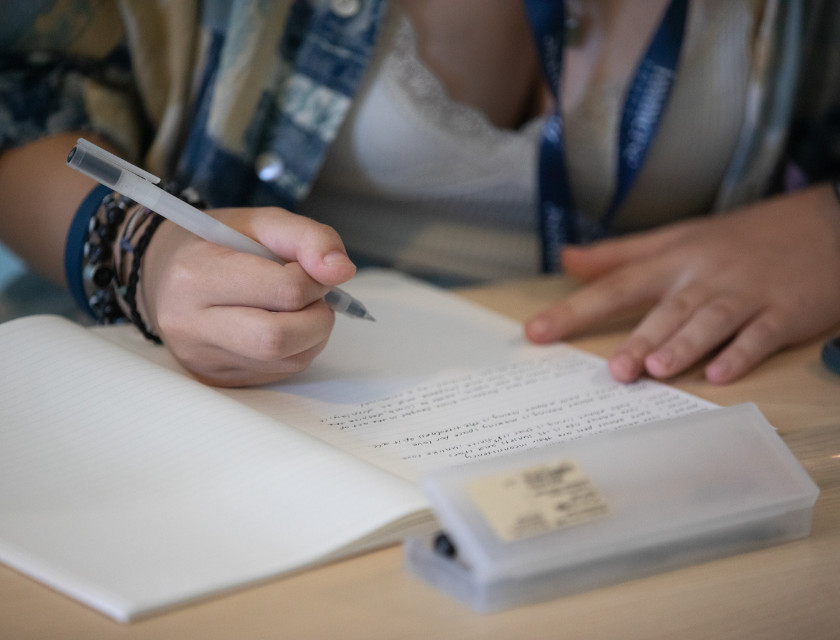
Are you searching for the best tips to create the most compelling essay? We’ve compiled some of the best essay writing tips so that you don’t have to search far and wide to learn how to write a good essay. Take a look at these top 100 essay writing tips!
100 Essay Writing Tips
#1 Analyse the question
#2 Define your argument
#3 Use reputable sources of evidence to support your claims (i.e. not Wikipedia)
#4 Share different perspectives
#5 On draft number 1, don’t worry about spelling, punctuation or grammar!
#6 Rewrite draft 2 on a new blank document
#7 Use transitional phrases and words
#8 Divide your essay into three main parts: introduction, main body, conclusion
#9 End your essay on a relevant quote
#10 Check your spelling, punctuation and grammar in your final draft
#11 Cite your sources correctly (check the guidelines or ask your teacher)
#12 Avoid using conjunctions at the start of sentences e.g. And / But / Also
#13 Put direct quotes in quotation marks, citing them correctly
#14 Avoid plagiarism (your teacher or the marker will know if you have copied)
#15 Rephrase your research – put it into your own words
#16 Avoid the repetition of phrases and words
#17 Use a thesaurus to find synonyms for words you have used often
#18 Provide statistics to support your claims
#19 Include facts to support your arguments
#20 Use emotive language where appropriate to write a compelling argument

#21 Avoid spending too much time on your introduction and conclusion
#22 Get somebody else to proofread it
#23 Get feedback from friends and family (or even a teacher)
#24 Don’t be afraid to delete irrelevant points and evidence
#25 Avoid slang and colloquial language
#26 Use formal language throughout your essay
#27 Double space your essay (check essay requirements to ensure you format it correctly)
#28 Use appropriate titles and headings
#29 Use an appropriate font (Times New Roman, size 12 is the most common, acceptable font)
#30 Avoid images unless you have been asked to use them
#31 Avoid talking about yourself or providing anecdotal information
#32 Avoid cliches, try to be original in your writing
#33 Keep your introduction and conclusion short
#34 Stick to the word count (universities usually allow 10% over or under)
#35 Distribute the word count appropriately across your introduction, main body and conclusion (e.g. 10/80/10)
#36 Read it out loud to spot errors
#37 Make sure your writing is clear and concise
#38 Avoid citing sources in your bibliography that are irrelevant
#39 Use grammar checking software to check for grammar errors
#40 Don’t depend solely on grammar checking software (because it’s a computer, it may get context wrong)
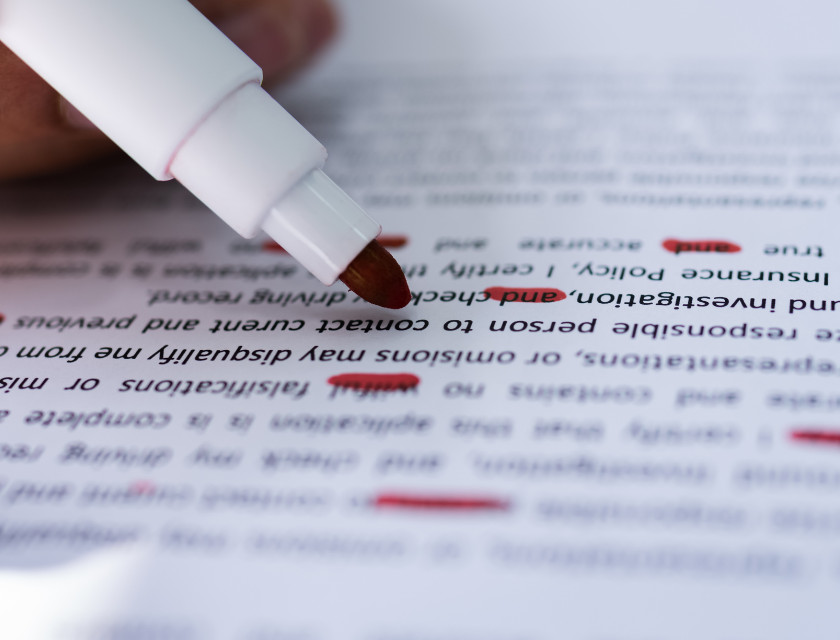
#41 Read your work critically – have you answered the question?
#42 Don’t get distracted by what you WANT to write, focus on answering the question
#43 Check the grading criteria and set your goals – if you want an A, what do you need to do to get there?
#44 Create a checklist based on the grading criteria
#45 Create a timetable to write your essay and plan your time wisely
#46 Plan your writing during times when you’re least likely to get disturbed
#47 Work in a place where you are least likely to get distracted
#48 Write your essay in 25-minute increments and take a break after each one
#49 Have snacks and refreshments to hand
#50 Take a break after writing each draft, for example, 2 days where you don’t look at it (this will allow you to process information and go back to your essay with fresh eyes)
#51 Remember that stress doesn’t help – you’re most likely going to write well when you’re the least stressed.
#52 If you’re struggling to write your essay at home, do it in a study group or at the library. You’ll likely be more productive surrounded by other people who are working, too.
#53 Don’t leave it to the last minute – write several drafts in good time
#54 Plan your final week to work on formatting only (do the bulk of the work way before the final week)
#55 Swap work with a friend and give each other feedback, or do this in a group
#56 Make sure you know the submission criteria way before submitting e.g. the format of your essay, rules for submission, etc.
#57 Define the type of essay you’re writing – is it argumentative, persuasive, expository, admissions, compare/contrast, analytical or narrative?
#58 Brainstorm the essay before writing it
#59 Keep your notes handy
#60 Identify the gaps in your knowledge before writing

#61 Before you begin writing, do as much productive research as you can
#62 Read relevant books and reputable articles to learn more about your topic
#63 Write notes in the form of short answers to your question, it will be easier to put them into your essay later on
#64 If you’re finding it difficult to answer the question, more research is needed
#65 Identify your WHY – Why do you need to write this essay? What will happen if you get an A or win the essay competition? Why is it important to you?
#66 When essay writing is becoming a struggle, remember your WHY to keep motivated
#67 In your introduction, remember to clearly state your topic and your main points
#68 Avoid explaining your points in your introduction (you do that in the main body)
#69 For every point or opinion you introduce, be sure to include some evidence and an explanation
#70 Avoid filling your essay up with opinions with no supporting evidence
#71 Explain your points clearly and concisely
#72 Stay on topic
#73 When proofreading, consider if the essay sparks the reader’s interest. If it doesn’t, see what you can do to improve this.
#74 Double check you have used paragraphs correctly
#75 Ensure each argument has a single focus and a clear connection to the thesis statement
#76 Ensure you have clear transitions between your sentences and paragraphs
#77 Ensure your essay has an informative and compelling style
#78 Try using these phrases such as: In view of; in light of; considering
#79 Use one of the following sentence structure when writing about your evidence “According to…” “…. stated that, “Referring to the views of…”
#80 Maintain an unbiased voice in your writing – your goal is to present some intriguing arguments to the reader

#81 Try using phrases such as “In order to…”, “To that end…”, “To this end…”
#82 Use phrases like these to emphasize a point: In other words; to put it another way; that is; to put it more simply
#83 Other phrases you could use are: Similarly; likewise; another key fact to remember; as well as; an equally significant aspect of
#84 When comparing ideas or opinions, use phrases such as: By contrast; in comparison; then again; that said; yet
#85 Use these phrases to demonstrate a positive aspect of something: Despite this; provided that; nonetheless
#86 Another way to add contrast is using these phrases: Importantly; significantly; notably; another key point
#87 When giving examples, try using phrases like these: For instance; to give an illustration of; to exemplify; to demonstrate; as evidence; to elucidate
#88 Try using these phrases in your conclusion: In conclusion; to conclude; to summarise; in sum; in the final analysis; on close analysis
#89 This phrase can be used to highlight the most compelling argument in your research “the most compelling argument is…”
#90 When explaining the significance of something, use one of these phrases: Therefore; this suggests that; it can be seen that; the consequence is
#91 When summarizing, you can use some of these phrases: Above all; chiefly; especially; most significantly; it should be noted
#92 You might want to use the phrase “All things considered” when summarizing towards the end of your essay
#93 Avoid using Wikipedia
#94 Remember that the marker will always check to see if you have copied your work – so don’t do it
#95 Try your best
#96 Remember that writing an essay is also an opportunity to learn
#97 Build your vocabulary while writing by using a dictionary to replace common words
#98 Make sure you understand the definition of the words you have used
#99 Work hard but remember to take breaks
#100 Submit your essay on time!
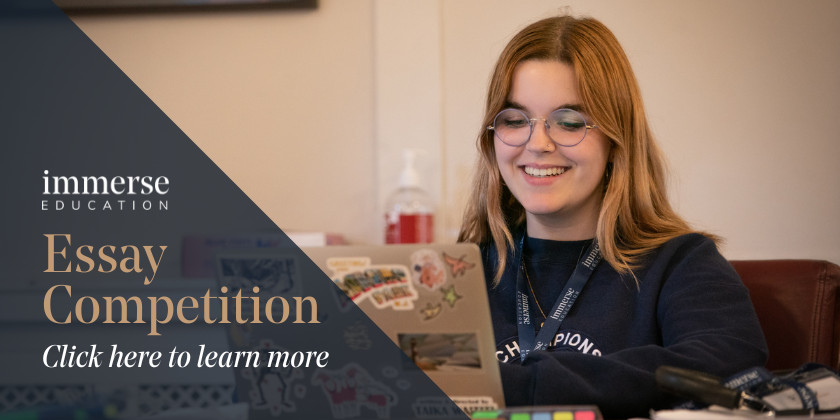
- Administrator
- July 2, 2024
We will send you updates and the latest news about our company. Sign up for free by filling out the form.
- Name * First Last
- School Country
- School City
- School Name
- School counsellor/advisor
- Educational agent
- I consent to receiving updates from Immerse Education
- Yes. See Privacy Policy
Download Our Prospectus
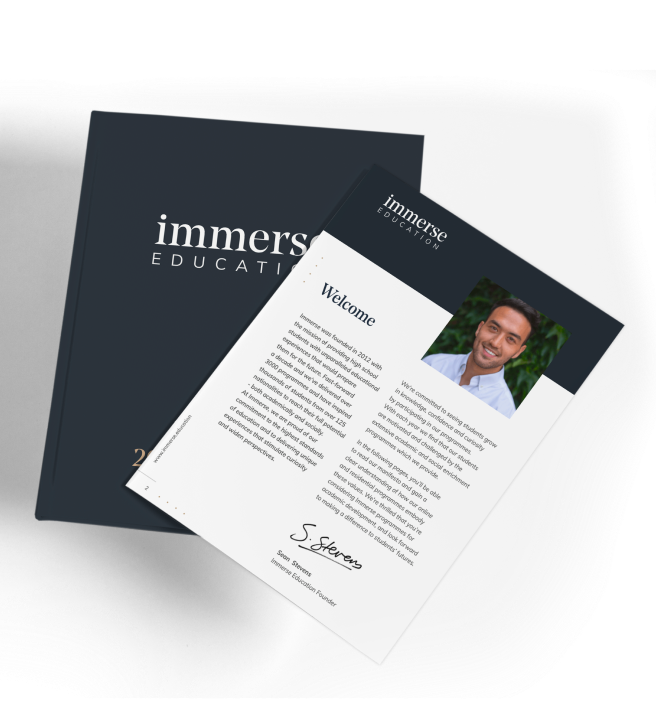
- I'm a Parent
- I'm a Student
- First Name *
- Last Name *
- School SF ID
- Which subjects interest you? (Optional) Architecture Artificial Intelligence Banking and Finance Biology Biotechnology Business Management Chemistry Coding Computer Science Computer Science and Artificial Intelligence Creative Writing Creative Writing and Film Criminology Data Science and Analytics Earth Science Economics Encryption and Cybersecurity Engineering English Literature Entrepreneurship Fashion and Design Female Future Leaders Film Studies Fine Arts Global Society and Sustainability Health and Biotechnology History International Relations Law Marketing and Entertainment Mathematics Medicine Medicine and Health Sciences Nanotechnology Natural Sciences Philosophy Philosophy Politics and Economics Physics Psychology Software Development and AI Software Development and Gaming Veterinary Studies Online Research Programme
Secure priority enrolment for our new summer school location with a small refundable deposit.
" * " indicates required fields
Receive priority enrolment for new summer school locations by registering your interest below.
Our programme consultant will contact you to talk about your options.
- Family Name *
- Phone Number
- Yes. See Privacy Policy.
Subject is unavailable at location
You have selected a subject that is not available at the location that you have previously chosen.
The location filter has been reset, and you are now able to search for all the courses where we offer the subject.

How to Write an Essay
Use the links below to jump directly to any section of this guide:
Essay Writing Fundamentals
How to prepare to write an essay, how to edit an essay, how to share and publish your essays, how to get essay writing help, how to find essay writing inspiration, resources for teaching essay writing.
Essays, short prose compositions on a particular theme or topic, are the bread and butter of academic life. You write them in class, for homework, and on standardized tests to show what you know. Unlike other kinds of academic writing (like the research paper) and creative writing (like short stories and poems), essays allow you to develop your original thoughts on a prompt or question. Essays come in many varieties: they can be expository (fleshing out an idea or claim), descriptive, (explaining a person, place, or thing), narrative (relating a personal experience), or persuasive (attempting to win over a reader). This guide is a collection of dozens of links about academic essay writing that we have researched, categorized, and annotated in order to help you improve your essay writing.
Essays are different from other forms of writing; in turn, there are different kinds of essays. This section contains general resources for getting to know the essay and its variants. These resources introduce and define the essay as a genre, and will teach you what to expect from essay-based assessments.
Purdue OWL Online Writing Lab
One of the most trusted academic writing sites, Purdue OWL provides a concise introduction to the four most common types of academic essays.
"The Essay: History and Definition" (ThoughtCo)
This snappy article from ThoughtCo talks about the origins of the essay and different kinds of essays you might be asked to write.
"What Is An Essay?" Video Lecture (Coursera)
The University of California at Irvine's free video lecture, available on Coursera, tells you everything you need to know about the essay.
Wikipedia Article on the "Essay"
Wikipedia's article on the essay is comprehensive, providing both English-language and global perspectives on the essay form. Learn about the essay's history, forms, and styles.
"Understanding College and Academic Writing" (Aims Online Writing Lab)
This list of common academic writing assignments (including types of essay prompts) will help you know what to expect from essay-based assessments.
Before you start writing your essay, you need to figure out who you're writing for (audience), what you're writing about (topic/theme), and what you're going to say (argument and thesis). This section contains links to handouts, chapters, videos and more to help you prepare to write an essay.
How to Identify Your Audience
"Audience" (Univ. of North Carolina Writing Center)
This handout provides questions you can ask yourself to determine the audience for an academic writing assignment. It also suggests strategies for fitting your paper to your intended audience.
"Purpose, Audience, Tone, and Content" (Univ. of Minnesota Libraries)
This extensive book chapter from Writing for Success , available online through Minnesota Libraries Publishing, is followed by exercises to try out your new pre-writing skills.
"Determining Audience" (Aims Online Writing Lab)
This guide from a community college's writing center shows you how to know your audience, and how to incorporate that knowledge in your thesis statement.
"Know Your Audience" ( Paper Rater Blog)
This short blog post uses examples to show how implied audiences for essays differ. It reminds you to think of your instructor as an observer, who will know only the information you pass along.
How to Choose a Theme or Topic
"Research Tutorial: Developing Your Topic" (YouTube)
Take a look at this short video tutorial from the University of North Carolina at Chapel Hill to understand the basics of developing a writing topic.
"How to Choose a Paper Topic" (WikiHow)
This simple, step-by-step guide (with pictures!) walks you through choosing a paper topic. It starts with a detailed description of brainstorming and ends with strategies to refine your broad topic.
"How to Read an Assignment: Moving From Assignment to Topic" (Harvard College Writing Center)
Did your teacher give you a prompt or other instructions? This guide helps you understand the relationship between an essay assignment and your essay's topic.
"Guidelines for Choosing a Topic" (CliffsNotes)
This study guide from CliffsNotes both discusses how to choose a topic and makes a useful distinction between "topic" and "thesis."
How to Come Up with an Argument
"Argument" (Univ. of North Carolina Writing Center)
Not sure what "argument" means in the context of academic writing? This page from the University of North Carolina is a good place to start.
"The Essay Guide: Finding an Argument" (Study Hub)
This handout explains why it's important to have an argument when beginning your essay, and provides tools to help you choose a viable argument.
"Writing a Thesis and Making an Argument" (University of Iowa)
This page from the University of Iowa's Writing Center contains exercises through which you can develop and refine your argument and thesis statement.
"Developing a Thesis" (Harvard College Writing Center)
This page from Harvard's Writing Center collates some helpful dos and don'ts of argumentative writing, from steps in constructing a thesis to avoiding vague and confrontational thesis statements.
"Suggestions for Developing Argumentative Essays" (Berkeley Student Learning Center)
This page offers concrete suggestions for each stage of the essay writing process, from topic selection to drafting and editing.
How to Outline your Essay
"Outlines" (Univ. of North Carolina at Chapel Hill via YouTube)
This short video tutorial from the University of North Carolina at Chapel Hill shows how to group your ideas into paragraphs or sections to begin the outlining process.
"Essay Outline" (Univ. of Washington Tacoma)
This two-page handout by a university professor simply defines the parts of an essay and then organizes them into an example outline.
"Types of Outlines and Samples" (Purdue OWL Online Writing Lab)
Purdue OWL gives examples of diverse outline strategies on this page, including the alphanumeric, full sentence, and decimal styles.
"Outlining" (Harvard College Writing Center)
Once you have an argument, according to this handout, there are only three steps in the outline process: generalizing, ordering, and putting it all together. Then you're ready to write!
"Writing Essays" (Plymouth Univ.)
This packet, part of Plymouth University's Learning Development series, contains descriptions and diagrams relating to the outlining process.
"How to Write A Good Argumentative Essay: Logical Structure" (Criticalthinkingtutorials.com via YouTube)
This longer video tutorial gives an overview of how to structure your essay in order to support your argument or thesis. It is part of a longer course on academic writing hosted on Udemy.
Now that you've chosen and refined your topic and created an outline, use these resources to complete the writing process. Most essays contain introductions (which articulate your thesis statement), body paragraphs, and conclusions. Transitions facilitate the flow from one paragraph to the next so that support for your thesis builds throughout the essay. Sources and citations show where you got the evidence to support your thesis, which ensures that you avoid plagiarism.
How to Write an Introduction
"Introductions" (Univ. of North Carolina Writing Center)
This page identifies the role of the introduction in any successful paper, suggests strategies for writing introductions, and warns against less effective introductions.
"How to Write A Good Introduction" (Michigan State Writing Center)
Beginning with the most common missteps in writing introductions, this guide condenses the essentials of introduction composition into seven points.
"The Introductory Paragraph" (ThoughtCo)
This blog post from academic advisor and college enrollment counselor Grace Fleming focuses on ways to grab your reader's attention at the beginning of your essay.
"Introductions and Conclusions" (Univ. of Toronto)
This guide from the University of Toronto gives advice that applies to writing both introductions and conclusions, including dos and don'ts.
"How to Write Better Essays: No One Does Introductions Properly" ( The Guardian )
This news article interviews UK professors on student essay writing; they point to introductions as the area that needs the most improvement.
How to Write a Thesis Statement
"Writing an Effective Thesis Statement" (YouTube)
This short, simple video tutorial from a college composition instructor at Tulsa Community College explains what a thesis statement is and what it does.
"Thesis Statement: Four Steps to a Great Essay" (YouTube)
This fantastic tutorial walks you through drafting a thesis, using an essay prompt on Nathaniel Hawthorne's The Scarlet Letter as an example.
"How to Write a Thesis Statement" (WikiHow)
This step-by-step guide (with pictures!) walks you through coming up with, writing, and editing a thesis statement. It invites you think of your statement as a "working thesis" that can change.
"How to Write a Thesis Statement" (Univ. of Indiana Bloomington)
Ask yourself the questions on this page, part of Indiana Bloomington's Writing Tutorial Services, when you're writing and refining your thesis statement.
"Writing Tips: Thesis Statements" (Univ. of Illinois Center for Writing Studies)
This page gives plentiful examples of good to great thesis statements, and offers questions to ask yourself when formulating a thesis statement.
How to Write Body Paragraphs
"Body Paragraph" (Brightstorm)
This module of a free online course introduces you to the components of a body paragraph. These include the topic sentence, information, evidence, and analysis.
"Strong Body Paragraphs" (Washington Univ.)
This handout from Washington's Writing and Research Center offers in-depth descriptions of the parts of a successful body paragraph.
"Guide to Paragraph Structure" (Deakin Univ.)
This handout is notable for color-coding example body paragraphs to help you identify the functions various sentences perform.
"Writing Body Paragraphs" (Univ. of Minnesota Libraries)
The exercises in this section of Writing for Success will help you practice writing good body paragraphs. It includes guidance on selecting primary support for your thesis.
"The Writing Process—Body Paragraphs" (Aims Online Writing Lab)
The information and exercises on this page will familiarize you with outlining and writing body paragraphs, and includes links to more information on topic sentences and transitions.
"The Five-Paragraph Essay" (ThoughtCo)
This blog post discusses body paragraphs in the context of one of the most common academic essay types in secondary schools.
How to Use Transitions
"Transitions" (Univ. of North Carolina Writing Center)
This page from the University of North Carolina at Chapel Hill explains what a transition is, and how to know if you need to improve your transitions.
"Using Transitions Effectively" (Washington Univ.)
This handout defines transitions, offers tips for using them, and contains a useful list of common transitional words and phrases grouped by function.
"Transitions" (Aims Online Writing Lab)
This page compares paragraphs without transitions to paragraphs with transitions, and in doing so shows how important these connective words and phrases are.
"Transitions in Academic Essays" (Scribbr)
This page lists four techniques that will help you make sure your reader follows your train of thought, including grouping similar information and using transition words.
"Transitions" (El Paso Community College)
This handout shows example transitions within paragraphs for context, and explains how transitions improve your essay's flow and voice.
"Make Your Paragraphs Flow to Improve Writing" (ThoughtCo)
This blog post, another from academic advisor and college enrollment counselor Grace Fleming, talks about transitions and other strategies to improve your essay's overall flow.
"Transition Words" (smartwords.org)
This handy word bank will help you find transition words when you're feeling stuck. It's grouped by the transition's function, whether that is to show agreement, opposition, condition, or consequence.
How to Write a Conclusion
"Parts of An Essay: Conclusions" (Brightstorm)
This module of a free online course explains how to conclude an academic essay. It suggests thinking about the "3Rs": return to hook, restate your thesis, and relate to the reader.
"Essay Conclusions" (Univ. of Maryland University College)
This overview of the academic essay conclusion contains helpful examples and links to further resources for writing good conclusions.
"How to End An Essay" (WikiHow)
This step-by-step guide (with pictures!) by an English Ph.D. walks you through writing a conclusion, from brainstorming to ending with a flourish.
"Ending the Essay: Conclusions" (Harvard College Writing Center)
This page collates useful strategies for writing an effective conclusion, and reminds you to "close the discussion without closing it off" to further conversation.
How to Include Sources and Citations
"Research and Citation Resources" (Purdue OWL Online Writing Lab)
Purdue OWL streamlines information about the three most common referencing styles (MLA, Chicago, and APA) and provides examples of how to cite different resources in each system.
EasyBib: Free Bibliography Generator
This online tool allows you to input information about your source and automatically generate citations in any style. Be sure to select your resource type before clicking the "cite it" button.
CitationMachine
Like EasyBib, this online tool allows you to input information about your source and automatically generate citations in any style.
Modern Language Association Handbook (MLA)
Here, you'll find the definitive and up-to-date record of MLA referencing rules. Order through the link above, or check to see if your library has a copy.
Chicago Manual of Style
Here, you'll find the definitive and up-to-date record of Chicago referencing rules. You can take a look at the table of contents, then choose to subscribe or start a free trial.
How to Avoid Plagiarism
"What is Plagiarism?" (plagiarism.org)
This nonprofit website contains numerous resources for identifying and avoiding plagiarism, and reminds you that even common activities like copying images from another website to your own site may constitute plagiarism.
"Plagiarism" (University of Oxford)
This interactive page from the University of Oxford helps you check for plagiarism in your work, making it clear how to avoid citing another person's work without full acknowledgement.
"Avoiding Plagiarism" (MIT Comparative Media Studies)
This quick guide explains what plagiarism is, what its consequences are, and how to avoid it. It starts by defining three words—quotation, paraphrase, and summary—that all constitute citation.
"Harvard Guide to Using Sources" (Harvard Extension School)
This comprehensive website from Harvard brings together articles, videos, and handouts about referencing, citation, and plagiarism.
Grammarly contains tons of helpful grammar and writing resources, including a free tool to automatically scan your essay to check for close affinities to published work.
Noplag is another popular online tool that automatically scans your essay to check for signs of plagiarism. Simply copy and paste your essay into the box and click "start checking."
Once you've written your essay, you'll want to edit (improve content), proofread (check for spelling and grammar mistakes), and finalize your work until you're ready to hand it in. This section brings together tips and resources for navigating the editing process.
"Writing a First Draft" (Academic Help)
This is an introduction to the drafting process from the site Academic Help, with tips for getting your ideas on paper before editing begins.
"Editing and Proofreading" (Univ. of North Carolina Writing Center)
This page provides general strategies for revising your writing. They've intentionally left seven errors in the handout, to give you practice in spotting them.
"How to Proofread Effectively" (ThoughtCo)
This article from ThoughtCo, along with those linked at the bottom, help describe common mistakes to check for when proofreading.
"7 Simple Edits That Make Your Writing 100% More Powerful" (SmartBlogger)
This blog post emphasizes the importance of powerful, concise language, and reminds you that even your personal writing heroes create clunky first drafts.
"Editing Tips for Effective Writing" (Univ. of Pennsylvania)
On this page from Penn's International Relations department, you'll find tips for effective prose, errors to watch out for, and reminders about formatting.
"Editing the Essay" (Harvard College Writing Center)
This article, the first of two parts, gives you applicable strategies for the editing process. It suggests reading your essay aloud, removing any jargon, and being unafraid to remove even "dazzling" sentences that don't belong.
"Guide to Editing and Proofreading" (Oxford Learning Institute)
This handout from Oxford covers the basics of editing and proofreading, and reminds you that neither task should be rushed.
In addition to plagiarism-checkers, Grammarly has a plug-in for your web browser that checks your writing for common mistakes.
After you've prepared, written, and edited your essay, you might want to share it outside the classroom. This section alerts you to print and web opportunities to share your essays with the wider world, from online writing communities and blogs to published journals geared toward young writers.
Sharing Your Essays Online
Go Teen Writers
Go Teen Writers is an online community for writers aged 13 - 19. It was founded by Stephanie Morrill, an author of contemporary young adult novels.
Tumblr is a blogging website where you can share your writing and interact with other writers online. It's easy to add photos, links, audio, and video components.
Writersky provides an online platform for publishing and reading other youth writers' work. Its current content is mostly devoted to fiction.
Publishing Your Essays Online
This teen literary journal publishes in print, on the web, and (more frequently), on a blog. It is committed to ensuring that "teens see their authentic experience reflected on its pages."
The Matador Review
This youth writing platform celebrates "alternative," unconventional writing. The link above will take you directly to the site's "submissions" page.
Teen Ink has a website, monthly newsprint magazine, and quarterly poetry magazine promoting the work of young writers.
The largest online reading platform, Wattpad enables you to publish your work and read others' work. Its inline commenting feature allows you to share thoughts as you read along.
Publishing Your Essays in Print
Canvas Teen Literary Journal
This quarterly literary magazine is published for young writers by young writers. They accept many kinds of writing, including essays.
The Claremont Review
This biannual international magazine, first published in 1992, publishes poetry, essays, and short stories from writers aged 13 - 19.
Skipping Stones
This young writers magazine, founded in 1988, celebrates themes relating to ecological and cultural diversity. It publishes poems, photos, articles, and stories.
The Telling Room
This nonprofit writing center based in Maine publishes children's work on their website and in book form. The link above directs you to the site's submissions page.
Essay Contests
Scholastic Arts and Writing Awards
This prestigious international writing contest for students in grades 7 - 12 has been committed to "supporting the future of creativity since 1923."
Society of Professional Journalists High School Essay Contest
An annual essay contest on the theme of journalism and media, the Society of Professional Journalists High School Essay Contest awards scholarships up to $1,000.
National YoungArts Foundation
Here, you'll find information on a government-sponsored writing competition for writers aged 15 - 18. The foundation welcomes submissions of creative nonfiction, novels, scripts, poetry, short story and spoken word.
Signet Classics Student Scholarship Essay Contest
With prompts on a different literary work each year, this competition from Signet Classics awards college scholarships up to $1,000.
"The Ultimate Guide to High School Essay Contests" (CollegeVine)
See this handy guide from CollegeVine for a list of more competitions you can enter with your academic essay, from the National Council of Teachers of English Achievement Awards to the National High School Essay Contest by the U.S. Institute of Peace.
Whether you're struggling to write academic essays or you think you're a pro, there are workshops and online tools that can help you become an even better writer. Even the most seasoned writers encounter writer's block, so be proactive and look through our curated list of resources to combat this common frustration.
Online Essay-writing Classes and Workshops
"Getting Started with Essay Writing" (Coursera)
Coursera offers lots of free, high-quality online classes taught by college professors. Here's one example, taught by instructors from the University of California Irvine.
"Writing and English" (Brightstorm)
Brightstorm's free video lectures are easy to navigate by topic. This unit on the parts of an essay features content on the essay hook, thesis, supporting evidence, and more.
"How to Write an Essay" (EdX)
EdX is another open online university course website with several two- to five-week courses on the essay. This one is geared toward English language learners.
Writer's Digest University
This renowned writers' website offers online workshops and interactive tutorials. The courses offered cover everything from how to get started through how to get published.
Writing.com
Signing up for this online writer's community gives you access to helpful resources as well as an international community of writers.
How to Overcome Writer's Block
"Symptoms and Cures for Writer's Block" (Purdue OWL)
Purdue OWL offers a list of signs you might have writer's block, along with ways to overcome it. Consider trying out some "invention strategies" or ways to curb writing anxiety.
"Overcoming Writer's Block: Three Tips" ( The Guardian )
These tips, geared toward academic writing specifically, are practical and effective. The authors advocate setting realistic goals, creating dedicated writing time, and participating in social writing.
"Writing Tips: Strategies for Overcoming Writer's Block" (Univ. of Illinois)
This page from the University of Illinois at Urbana-Champaign's Center for Writing Studies acquaints you with strategies that do and do not work to overcome writer's block.
"Writer's Block" (Univ. of Toronto)
Ask yourself the questions on this page; if the answer is "yes," try out some of the article's strategies. Each question is accompanied by at least two possible solutions.
If you have essays to write but are short on ideas, this section's links to prompts, example student essays, and celebrated essays by professional writers might help. You'll find writing prompts from a variety of sources, student essays to inspire you, and a number of essay writing collections.
Essay Writing Prompts
"50 Argumentative Essay Topics" (ThoughtCo)
Take a look at this list and the others ThoughtCo has curated for different kinds of essays. As the author notes, "a number of these topics are controversial and that's the point."
"401 Prompts for Argumentative Writing" ( New York Times )
This list (and the linked lists to persuasive and narrative writing prompts), besides being impressive in length, is put together by actual high school English teachers.
"SAT Sample Essay Prompts" (College Board)
If you're a student in the U.S., your classroom essay prompts are likely modeled on the prompts in U.S. college entrance exams. Take a look at these official examples from the SAT.
"Popular College Application Essay Topics" (Princeton Review)
This page from the Princeton Review dissects recent Common Application essay topics and discusses strategies for answering them.
Example Student Essays
"501 Writing Prompts" (DePaul Univ.)
This nearly 200-page packet, compiled by the LearningExpress Skill Builder in Focus Writing Team, is stuffed with writing prompts, example essays, and commentary.
"Topics in English" (Kibin)
Kibin is a for-pay essay help website, but its example essays (organized by topic) are available for free. You'll find essays on everything from A Christmas Carol to perseverance.
"Student Writing Models" (Thoughtful Learning)
Thoughtful Learning, a website that offers a variety of teaching materials, provides sample student essays on various topics and organizes them by grade level.
"Five-Paragraph Essay" (ThoughtCo)
In this blog post by a former professor of English and rhetoric, ThoughtCo brings together examples of five-paragraph essays and commentary on the form.
The Best Essay Writing Collections
The Best American Essays of the Century by Joyce Carol Oates (Amazon)
This collection of American essays spanning the twentieth century was compiled by award winning author and Princeton professor Joyce Carol Oates.
The Best American Essays 2017 by Leslie Jamison (Amazon)
Leslie Jamison, the celebrated author of essay collection The Empathy Exams , collects recent, high-profile essays into a single volume.
The Art of the Personal Essay by Phillip Lopate (Amazon)
Documentary writer Phillip Lopate curates this historical overview of the personal essay's development, from the classical era to the present.
The White Album by Joan Didion (Amazon)
This seminal essay collection was authored by one of the most acclaimed personal essayists of all time, American journalist Joan Didion.
Consider the Lobster by David Foster Wallace (Amazon)
Read this famous essay collection by David Foster Wallace, who is known for his experimentation with the essay form. He pushed the boundaries of personal essay, reportage, and political polemic.
"50 Successful Harvard Application Essays" (Staff of the The Harvard Crimson )
If you're looking for examples of exceptional college application essays, this volume from Harvard's daily student newspaper is one of the best collections on the market.
Are you an instructor looking for the best resources for teaching essay writing? This section contains resources for developing in-class activities and student homework assignments. You'll find content from both well-known university writing centers and online writing labs.
Essay Writing Classroom Activities for Students
"In-class Writing Exercises" (Univ. of North Carolina Writing Center)
This page lists exercises related to brainstorming, organizing, drafting, and revising. It also contains suggestions for how to implement the suggested exercises.
"Teaching with Writing" (Univ. of Minnesota Center for Writing)
Instructions and encouragement for using "freewriting," one-minute papers, logbooks, and other write-to-learn activities in the classroom can be found here.
"Writing Worksheets" (Berkeley Student Learning Center)
Berkeley offers this bank of writing worksheets to use in class. They are nested under headings for "Prewriting," "Revision," "Research Papers" and more.
"Using Sources and Avoiding Plagiarism" (DePaul University)
Use these activities and worksheets from DePaul's Teaching Commons when instructing students on proper academic citation practices.
Essay Writing Homework Activities for Students
"Grammar and Punctuation Exercises" (Aims Online Writing Lab)
These five interactive online activities allow students to practice editing and proofreading. They'll hone their skills in correcting comma splices and run-ons, identifying fragments, using correct pronoun agreement, and comma usage.
"Student Interactives" (Read Write Think)
Read Write Think hosts interactive tools, games, and videos for developing writing skills. They can practice organizing and summarizing, writing poetry, and developing lines of inquiry and analysis.
This free website offers writing and grammar activities for all grade levels. The lessons are designed to be used both for large classes and smaller groups.
"Writing Activities and Lessons for Every Grade" (Education World)
Education World's page on writing activities and lessons links you to more free, online resources for learning how to "W.R.I.T.E.": write, revise, inform, think, and edit.
- PDFs for all 136 Lit Terms we cover
- Downloads of 1964 LitCharts Lit Guides
- Teacher Editions for every Lit Guide
- Explanations and citation info for 41,397 quotes across 1964 books
- Downloadable (PDF) line-by-line translations of every Shakespeare play
Need something? Request a new guide .
How can we improve? Share feedback .
LitCharts is hiring!

- Tips for Reading an Assignment Prompt
- Asking Analytical Questions
- Introductions
- What Do Introductions Across the Disciplines Have in Common?
- Anatomy of a Body Paragraph
- Transitions
- Tips for Organizing Your Essay
- Counterargument
- Conclusions
- Strategies for Essay Writing: Downloadable PDFs
- Brief Guides to Writing in the Disciplines
- Academic Skills
- Reading, writing and referencing
Writing a great essay
This resource covers key considerations when writing an essay.
While reading a student’s essay, markers will ask themselves questions such as:
- Does this essay directly address the set task?
- Does it present a strong, supported position?
- Does it use relevant sources appropriately?
- Is the expression clear, and the style appropriate?
- Is the essay organised coherently? Is there a clear introduction, body and conclusion?
You can use these questions to reflect on your own writing. Here are six top tips to help you address these criteria.
1. Analyse the question
Student essays are responses to specific questions. As an essay must address the question directly, your first step should be to analyse the question. Make sure you know exactly what is being asked of you.
Generally, essay questions contain three component parts:
- Content terms: Key concepts that are specific to the task
- Limiting terms: The scope that the topic focuses on
- Directive terms: What you need to do in relation to the content, e.g. discuss, analyse, define, compare, evaluate.
Look at the following essay question:
Discuss the importance of light in Gothic architecture.
- Content terms: Gothic architecture
- Limiting terms: the importance of light. If you discussed some other feature of Gothic architecture, for example spires or arches, you would be deviating from what is required. This essay question is limited to a discussion of light. Likewise, it asks you to write about the importance of light – not, for example, to discuss how light enters Gothic churches.
- Directive term: discuss. This term asks you to take a broad approach to the variety of ways in which light may be important for Gothic architecture. You should introduce and consider different ideas and opinions that you have met in academic literature on this topic, citing them appropriately .
For a more complex question, you can highlight the key words and break it down into a series of sub-questions to make sure you answer all parts of the task. Consider the following question (from Arts):
To what extent can the American Revolution be understood as a revolution ‘from below’? Why did working people become involved and with what aims in mind?
The key words here are American Revolution and revolution ‘from below’. This is a view that you would need to respond to in this essay. This response must focus on the aims and motivations of working people in the revolution, as stated in the second question.
2. Define your argument
As you plan and prepare to write the essay, you must consider what your argument is going to be. This means taking an informed position or point of view on the topic presented in the question, then defining and presenting a specific argument.
Consider these two argument statements:
The architectural use of light in Gothic cathedrals physically embodied the significance of light in medieval theology.
In the Gothic cathedral of Cologne, light served to accentuate the authority and ritual centrality of the priest.
Statements like these define an essay’s argument. They give coherence by providing an overarching theme and position towards which the entire essay is directed.
3. Use evidence, reasoning and scholarship
To convince your audience of your argument, you must use evidence and reasoning, which involves referring to and evaluating relevant scholarship.
- Evidence provides concrete information to support your claim. It typically consists of specific examples, facts, quotations, statistics and illustrations.
- Reasoning connects the evidence to your argument. Rather than citing evidence like a shopping list, you need to evaluate the evidence and show how it supports your argument.
- Scholarship is used to show how your argument relates to what has been written on the topic (citing specific works). Scholarship can be used as part of your evidence and reasoning to support your argument.
4. Organise a coherent essay
An essay has three basic components - introduction, body and conclusion.
The purpose of an introduction is to introduce your essay. It typically presents information in the following order:
- A general statement about the topic that provides context for your argument
- A thesis statement showing your argument. You can use explicit lead-ins, such as ‘This essay argues that...’
- A ‘road map’ of the essay, telling the reader how it is going to present and develop your argument.
Example introduction
"To what extent can the American Revolution be understood as a revolution ‘from below’? Why did working people become involved and with what aims in mind?"
Introduction*
Historians generally concentrate on the twenty-year period between 1763 and 1783 as the period which constitutes the American Revolution [This sentence sets the general context of the period] . However, when considering the involvement of working people, or people from below, in the revolution it is important to make a distinction between the pre-revolutionary period 1763-1774 and the revolutionary period 1774-1788, marked by the establishment of the continental Congress(1) [This sentence defines the key term from below and gives more context to the argument that follows] . This paper will argue that the nature and aims of the actions of working people are difficult to assess as it changed according to each phase [This is the thesis statement] . The pre-revolutionary period was characterised by opposition to Britain’s authority. During this period the aims and actions of the working people were more conservative as they responded to grievances related to taxes and scarce land, issues which directly affected them. However, examination of activities such as the organisation of crowd action and town meetings, pamphlet writing, formal communications to Britain of American grievances and physical action in the streets, demonstrates that their aims and actions became more revolutionary after 1775 [These sentences give the ‘road map’ or overview of the content of the essay] .
The body of the essay develops and elaborates your argument. It does this by presenting a reasoned case supported by evidence from relevant scholarship. Its shape corresponds to the overview that you provided in your introduction.
The body of your essay should be written in paragraphs. Each body paragraph should develop one main idea that supports your argument. To learn how to structure a paragraph, look at the page developing clarity and focus in academic writing .
Your conclusion should not offer any new material. Your evidence and argumentation should have been made clear to the reader in the body of the essay.
Use the conclusion to briefly restate the main argumentative position and provide a short summary of the themes discussed. In addition, also consider telling your reader:
- What the significance of your findings, or the implications of your conclusion, might be
- Whether there are other factors which need to be looked at, but which were outside the scope of the essay
- How your topic links to the wider context (‘bigger picture’) in your discipline.
Do not simply repeat yourself in this section. A conclusion which merely summarises is repetitive and reduces the impact of your paper.
Example conclusion
Conclusion*.
Although, to a large extent, the working class were mainly those in the forefront of crowd action and they also led the revolts against wealthy plantation farmers, the American Revolution was not a class struggle [This is a statement of the concluding position of the essay]. Working people participated because the issues directly affected them – the threat posed by powerful landowners and the tyranny Britain represented. Whereas the aims and actions of the working classes were more concerned with resistance to British rule during the pre-revolutionary period, they became more revolutionary in nature after 1775 when the tension with Britain escalated [These sentences restate the key argument]. With this shift, a change in ideas occurred. In terms of considering the Revolution as a whole range of activities such as organising riots, communicating to Britain, attendance at town hall meetings and pamphlet writing, a difficulty emerges in that all classes were involved. Therefore, it is impossible to assess the extent to which a single group such as working people contributed to the American Revolution [These sentences give final thoughts on the topic].
5. Write clearly
An essay that makes good, evidence-supported points will only receive a high grade if it is written clearly. Clarity is produced through careful revision and editing, which can turn a good essay into an excellent one.
When you edit your essay, try to view it with fresh eyes – almost as if someone else had written it.
Ask yourself the following questions:
Overall structure
- Have you clearly stated your argument in your introduction?
- Does the actual structure correspond to the ‘road map’ set out in your introduction?
- Have you clearly indicated how your main points support your argument?
- Have you clearly signposted the transitions between each of your main points for your reader?
- Does each paragraph introduce one main idea?
- Does every sentence in the paragraph support that main idea?
- Does each paragraph display relevant evidence and reasoning?
- Does each paragraph logically follow on from the one before it?
- Is each sentence grammatically complete?
- Is the spelling correct?
- Is the link between sentences clear to your readers?
- Have you avoided redundancy and repetition?
See more about editing on our editing your writing page.
6. Cite sources and evidence
Finally, check your citations to make sure that they are accurate and complete. Some faculties require you to use a specific citation style (e.g. APA) while others may allow you to choose a preferred one. Whatever style you use, you must follow its guidelines correctly and consistently. You can use Recite, the University of Melbourne style guide, to check your citations.
Further resources
- Germov, J. (2011). Get great marks for your essays, reports and presentations (3rd ed.). NSW: Allen and Unwin.
- Using English for Academic Purposes: A guide for students in Higher Education [online]. Retrieved January 2020 from http://www.uefap.com
- Williams, J.M. & Colomb, G. G. (2010) Style: Lessons in clarity and grace. 10th ed. New York: Longman.
* Example introduction and conclusion adapted from a student paper.

Looking for one-on-one advice?
Get tailored advice from an Academic Skills Adviser by booking an Individual appointment, or get quick feedback from one of our Academic Writing Mentors via email through our Writing advice service.
Go to Student appointments

Sample Essays
The breadth of Georgetown’s core curriculum means that students are required to write for a wide variety of academic disciplines. Below, we provide some student samples that exhibit the key features the most popular genres. When reading through these essays, we recommend paying attention to their
1. Structure (How many paragraphs are there? Does the author use headers?)
2. Argument (Is the author pointing out a problem, and/or proposing a solution?)
3. Content (Does the argument principally rely on facts, theory, or logic?) and
4. Style (Does the writer use first person? What is the relationship with the audience?)
Philosophy Paper
- Singer on the Moral Status of Animals
Theology Paper
- Problem of God
- Jewish Civilization
- Sacred Space and Time
- Phenolphthalein in Alkaline Solution
History Paper
- World History
Literature Review
Comparative Analysis
Policy Brief
- Vaccine Manufacturing
White Paper
Critical Analysis
- Ignatius Seminar

Choose Your Test
- Search Blogs By Category
- College Admissions
- AP and IB Exams
- GPA and Coursework
Getting College Essay Help: Important Do's and Don’ts
College Essays

If you grow up to be a professional writer, everything you write will first go through an editor before being published. This is because the process of writing is really a process of re-writing —of rethinking and reexamining your work, usually with the help of someone else. So what does this mean for your student writing? And in particular, what does it mean for very important, but nonprofessional writing like your college essay? Should you ask your parents to look at your essay? Pay for an essay service?
If you are wondering what kind of help you can, and should, get with your personal statement, you've come to the right place! In this article, I'll talk about what kind of writing help is useful, ethical, and even expected for your college admission essay . I'll also point out who would make a good editor, what the differences between editing and proofreading are, what to expect from a good editor, and how to spot and stay away from a bad one.
Table of Contents
What Kind of Help for Your Essay Can You Get?
What's Good Editing?
What should an editor do for you, what kind of editing should you avoid, proofreading, what's good proofreading, what kind of proofreading should you avoid.
What Do Colleges Think Of You Getting Help With Your Essay?
Who Can/Should Help You?
Advice for editors.
Should You Pay Money For Essay Editing?
The Bottom Line
What's next, what kind of help with your essay can you get.
Rather than talking in general terms about "help," let's first clarify the two different ways that someone else can improve your writing . There is editing, which is the more intensive kind of assistance that you can use throughout the whole process. And then there's proofreading, which is the last step of really polishing your final product.
Let me go into some more detail about editing and proofreading, and then explain how good editors and proofreaders can help you."
Editing is helping the author (in this case, you) go from a rough draft to a finished work . Editing is the process of asking questions about what you're saying, how you're saying it, and how you're organizing your ideas. But not all editing is good editing . In fact, it's very easy for an editor to cross the line from supportive to overbearing and over-involved.
Ability to clarify assignments. A good editor is usually a good writer, and certainly has to be a good reader. For example, in this case, a good editor should make sure you understand the actual essay prompt you're supposed to be answering.
Open-endedness. Good editing is all about asking questions about your ideas and work, but without providing answers. It's about letting you stick to your story and message, and doesn't alter your point of view.

Think of an editor as a great travel guide. It can show you the many different places your trip could take you. It should explain any parts of the trip that could derail your trip or confuse the traveler. But it never dictates your path, never forces you to go somewhere you don't want to go, and never ignores your interests so that the trip no longer seems like it's your own. So what should good editors do?
Help Brainstorm Topics
Sometimes it's easier to bounce thoughts off of someone else. This doesn't mean that your editor gets to come up with ideas, but they can certainly respond to the various topic options you've come up with. This way, you're less likely to write about the most boring of your ideas, or to write about something that isn't actually important to you.
If you're wondering how to come up with options for your editor to consider, check out our guide to brainstorming topics for your college essay .
Help Revise Your Drafts
Here, your editor can't upset the delicate balance of not intervening too much or too little. It's tricky, but a great way to think about it is to remember: editing is about asking questions, not giving answers .
Revision questions should point out:
- Places where more detail or more description would help the reader connect with your essay
- Places where structure and logic don't flow, losing the reader's attention
- Places where there aren't transitions between paragraphs, confusing the reader
- Moments where your narrative or the arguments you're making are unclear
But pointing to potential problems is not the same as actually rewriting—editors let authors fix the problems themselves.

Bad editing is usually very heavy-handed editing. Instead of helping you find your best voice and ideas, a bad editor changes your writing into their own vision.
You may be dealing with a bad editor if they:
- Add material (examples, descriptions) that doesn't come from you
- Use a thesaurus to make your college essay sound "more mature"
- Add meaning or insight to the essay that doesn't come from you
- Tell you what to say and how to say it
- Write sentences, phrases, and paragraphs for you
- Change your voice in the essay so it no longer sounds like it was written by a teenager
Colleges can tell the difference between a 17-year-old's writing and a 50-year-old's writing. Not only that, they have access to your SAT or ACT Writing section, so they can compare your essay to something else you wrote. Writing that's a little more polished is great and expected. But a totally different voice and style will raise questions.
Where's the Line Between Helpful Editing and Unethical Over-Editing?
Sometimes it's hard to tell whether your college essay editor is doing the right thing. Here are some guidelines for staying on the ethical side of the line.
- An editor should say that the opening paragraph is kind of boring, and explain what exactly is making it drag. But it's overstepping for an editor to tell you exactly how to change it.
- An editor should point out where your prose is unclear or vague. But it's completely inappropriate for the editor to rewrite that section of your essay.
- An editor should let you know that a section is light on detail or description. But giving you similes and metaphors to beef up that description is a no-go.

Proofreading (also called copy-editing) is checking for errors in the last draft of a written work. It happens at the end of the process and is meant as the final polishing touch. Proofreading is meticulous and detail-oriented, focusing on small corrections. It sands off all the surface rough spots that could alienate the reader.
Because proofreading is usually concerned with making fixes on the word or sentence level, this is the only process where someone else can actually add to or take away things from your essay . This is because what they are adding or taking away tends to be one or two misplaced letters.
Laser focus. Proofreading is all about the tiny details, so the ability to really concentrate on finding small slip-ups is a must.
Excellent grammar and spelling skills. Proofreaders need to dot every "i" and cross every "t." Good proofreaders should correct spelling, punctuation, capitalization, and grammar. They should put foreign words in italics and surround quotations with quotation marks. They should check that you used the correct college's name, and that you adhered to any formatting requirements (name and date at the top of the page, uniform font and size, uniform spacing).
Limited interference. A proofreader needs to make sure that you followed any word limits. But if cuts need to be made to shorten the essay, that's your job and not the proofreader's.

A bad proofreader either tries to turn into an editor, or just lacks the skills and knowledge necessary to do the job.
Some signs that you're working with a bad proofreader are:
- If they suggest making major changes to the final draft of your essay. Proofreading happens when editing is already finished.
- If they aren't particularly good at spelling, or don't know grammar, or aren't detail-oriented enough to find someone else's small mistakes.
- If they start swapping out your words for fancier-sounding synonyms, or changing the voice and sound of your essay in other ways. A proofreader is there to check for errors, not to take the 17-year-old out of your writing.

What Do Colleges Think of Your Getting Help With Your Essay?
Admissions officers agree: light editing and proofreading are good—even required ! But they also want to make sure you're the one doing the work on your essay. They want essays with stories, voice, and themes that come from you. They want to see work that reflects your actual writing ability, and that focuses on what you find important.
On the Importance of Editing
Get feedback. Have a fresh pair of eyes give you some feedback. Don't allow someone else to rewrite your essay, but do take advantage of others' edits and opinions when they seem helpful. ( Bates College )
Read your essay aloud to someone. Reading the essay out loud offers a chance to hear how your essay sounds outside your head. This exercise reveals flaws in the essay's flow, highlights grammatical errors and helps you ensure that you are communicating the exact message you intended. ( Dickinson College )
On the Value of Proofreading
Share your essays with at least one or two people who know you well—such as a parent, teacher, counselor, or friend—and ask for feedback. Remember that you ultimately have control over your essays, and your essays should retain your own voice, but others may be able to catch mistakes that you missed and help suggest areas to cut if you are over the word limit. ( Yale University )
Proofread and then ask someone else to proofread for you. Although we want substance, we also want to be able to see that you can write a paper for our professors and avoid careless mistakes that would drive them crazy. ( Oberlin College )
On Watching Out for Too Much Outside Influence
Limit the number of people who review your essay. Too much input usually means your voice is lost in the writing style. ( Carleton College )
Ask for input (but not too much). Your parents, friends, guidance counselors, coaches, and teachers are great people to bounce ideas off of for your essay. They know how unique and spectacular you are, and they can help you decide how to articulate it. Keep in mind, however, that a 45-year-old lawyer writes quite differently from an 18-year-old student, so if your dad ends up writing the bulk of your essay, we're probably going to notice. ( Vanderbilt University )

Now let's talk about some potential people to approach for your college essay editing and proofreading needs. It's best to start close to home and slowly expand outward. Not only are your family and friends more invested in your success than strangers, but they also have a better handle on your interests and personality. This knowledge is key for judging whether your essay is expressing your true self.
Parents or Close Relatives
Your family may be full of potentially excellent editors! Parents are deeply committed to your well-being, and family members know you and your life well enough to offer details or incidents that can be included in your essay. On the other hand, the rewriting process necessarily involves criticism, which is sometimes hard to hear from someone very close to you.
A parent or close family member is a great choice for an editor if you can answer "yes" to the following questions. Is your parent or close relative a good writer or reader? Do you have a relationship where editing your essay won't create conflict? Are you able to constructively listen to criticism and suggestion from the parent?
One suggestion for defusing face-to-face discussions is to try working on the essay over email. Send your parent a draft, have them write you back some comments, and then you can pick which of their suggestions you want to use and which to discard.
Teachers or Tutors
A humanities teacher that you have a good relationship with is a great choice. I am purposefully saying humanities, and not just English, because teachers of Philosophy, History, Anthropology, and any other classes where you do a lot of writing, are all used to reviewing student work.
Moreover, any teacher or tutor that has been working with you for some time, knows you very well and can vet the essay to make sure it "sounds like you."
If your teacher or tutor has some experience with what college essays are supposed to be like, ask them to be your editor. If not, then ask whether they have time to proofread your final draft.
Guidance or College Counselor at Your School
The best thing about asking your counselor to edit your work is that this is their job. This means that they have a very good sense of what colleges are looking for in an application essay.
At the same time, school counselors tend to have relationships with admissions officers in many colleges, which again gives them insight into what works and which college is focused on what aspect of the application.
Unfortunately, in many schools the guidance counselor tends to be way overextended. If your ratio is 300 students to 1 college counselor, you're unlikely to get that person's undivided attention and focus. It is still useful to ask them for general advice about your potential topics, but don't expect them to be able to stay with your essay from first draft to final version.
Friends, Siblings, or Classmates
Although they most likely don't have much experience with what colleges are hoping to see, your peers are excellent sources for checking that your essay is you .
Friends and siblings are perfect for the read-aloud edit. Read your essay to them so they can listen for words and phrases that are stilted, pompous, or phrases that just don't sound like you.
You can even trade essays and give helpful advice on each other's work.

If your editor hasn't worked with college admissions essays very much, no worries! Any astute and attentive reader can still greatly help with your process. But, as in all things, beginners do better with some preparation.
First, your editor should read our advice about how to write a college essay introduction , how to spot and fix a bad college essay , and get a sense of what other students have written by going through some admissions essays that worked .
Then, as they read your essay, they can work through the following series of questions that will help them to guide you.
Introduction Questions
- Is the first sentence a killer opening line? Why or why not?
- Does the introduction hook the reader? Does it have a colorful, detailed, and interesting narrative? Or does it propose a compelling or surprising idea?
- Can you feel the author's voice in the introduction, or is the tone dry, dull, or overly formal? Show the places where the voice comes through.
Essay Body Questions
- Does the essay have a through-line? Is it built around a central argument, thought, idea, or focus? Can you put this idea into your own words?
- How is the essay organized? By logical progression? Chronologically? Do you feel order when you read it, or are there moments where you are confused or lose the thread of the essay?
- Does the essay have both narratives about the author's life and explanations and insight into what these stories reveal about the author's character, personality, goals, or dreams? If not, which is missing?
- Does the essay flow? Are there smooth transitions/clever links between paragraphs? Between the narrative and moments of insight?
Reader Response Questions
- Does the writer's personality come through? Do we know what the speaker cares about? Do we get a sense of "who he or she is"?
- Where did you feel most connected to the essay? Which parts of the essay gave you a "you are there" sensation by invoking your senses? What moments could you picture in your head well?
- Where are the details and examples vague and not specific enough?
- Did you get an "a-ha!" feeling anywhere in the essay? Is there a moment of insight that connected all the dots for you? Is there a good reveal or "twist" anywhere in the essay?
- What are the strengths of this essay? What needs the most improvement?

Should You Pay Money for Essay Editing?
One alternative to asking someone you know to help you with your college essay is the paid editor route. There are two different ways to pay for essay help: a private essay coach or a less personal editing service , like the many proliferating on the internet.
My advice is to think of these options as a last resort rather than your go-to first choice. I'll first go through the reasons why. Then, if you do decide to go with a paid editor, I'll help you decide between a coach and a service.
When to Consider a Paid Editor
In general, I think hiring someone to work on your essay makes a lot of sense if none of the people I discussed above are a possibility for you.
If you can't ask your parents. For example, if your parents aren't good writers, or if English isn't their first language. Or if you think getting your parents to help is going create unnecessary extra conflict in your relationship with them (applying to college is stressful as it is!)
If you can't ask your teacher or tutor. Maybe you don't have a trusted teacher or tutor that has time to look over your essay with focus. Or, for instance, your favorite humanities teacher has very limited experience with college essays and so won't know what admissions officers want to see.
If you can't ask your guidance counselor. This could be because your guidance counselor is way overwhelmed with other students.
If you can't share your essay with those who know you. It might be that your essay is on a very personal topic that you're unwilling to share with parents, teachers, or peers. Just make sure it doesn't fall into one of the bad-idea topics in our article on bad college essays .
If the cost isn't a consideration. Many of these services are quite expensive, and private coaches even more so. If you have finite resources, I'd say that hiring an SAT or ACT tutor (whether it's PrepScholar or someone else) is better way to spend your money . This is because there's no guarantee that a slightly better essay will sufficiently elevate the rest of your application, but a significantly higher SAT score will definitely raise your applicant profile much more.
Should You Hire an Essay Coach?
On the plus side, essay coaches have read dozens or even hundreds of college essays, so they have experience with the format. Also, because you'll be working closely with a specific person, it's more personal than sending your essay to a service, which will know even less about you.
But, on the minus side, you'll still be bouncing ideas off of someone who doesn't know that much about you . In general, if you can adequately get the help from someone you know, there is no advantage to paying someone to help you.
If you do decide to hire a coach, ask your school counselor, or older students that have used the service for recommendations. If you can't afford the coach's fees, ask whether they can work on a sliding scale —many do. And finally, beware those who guarantee admission to your school of choice—essay coaches don't have any special magic that can back up those promises.
Should You Send Your Essay to a Service?
On the plus side, essay editing services provide a similar product to essay coaches, and they cost significantly less . If you have some assurance that you'll be working with a good editor, the lack of face-to-face interaction won't prevent great results.
On the minus side, however, it can be difficult to gauge the quality of the service before working with them . If they are churning through many application essays without getting to know the students they are helping, you could end up with an over-edited essay that sounds just like everyone else's. In the worst case scenario, an unscrupulous service could send you back a plagiarized essay.
Getting recommendations from friends or a school counselor for reputable services is key to avoiding heavy-handed editing that writes essays for you or does too much to change your essay. Including a badly-edited essay like this in your application could cause problems if there are inconsistencies. For example, in interviews it might be clear you didn't write the essay, or the skill of the essay might not be reflected in your schoolwork and test scores.
Should You Buy an Essay Written by Someone Else?
Let me elaborate. There are super sketchy places on the internet where you can simply buy a pre-written essay. Don't do this!
For one thing, you'll be lying on an official, signed document. All college applications make you sign a statement saying something like this:
I certify that all information submitted in the admission process—including the application, the personal essay, any supplements, and any other supporting materials—is my own work, factually true, and honestly presented... I understand that I may be subject to a range of possible disciplinary actions, including admission revocation, expulsion, or revocation of course credit, grades, and degree, should the information I have certified be false. (From the Common Application )
For another thing, if your academic record doesn't match the essay's quality, the admissions officer will start thinking your whole application is riddled with lies.
Admission officers have full access to your writing portion of the SAT or ACT so that they can compare work that was done in proctored conditions with that done at home. They can tell if these were written by different people. Not only that, but there are now a number of search engines that faculty and admission officers can use to see if an essay contains strings of words that have appeared in other essays—you have no guarantee that the essay you bought wasn't also bought by 50 other students.

- You should get college essay help with both editing and proofreading
- A good editor will ask questions about your idea, logic, and structure, and will point out places where clarity is needed
- A good editor will absolutely not answer these questions, give you their own ideas, or write the essay or parts of the essay for you
- A good proofreader will find typos and check your formatting
- All of them agree that getting light editing and proofreading is necessary
- Parents, teachers, guidance or college counselor, and peers or siblings
- If you can't ask any of those, you can pay for college essay help, but watch out for services or coaches who over-edit you work
- Don't buy a pre-written essay! Colleges can tell, and it'll make your whole application sound false.
Ready to start working on your essay? Check out our explanation of the point of the personal essay and the role it plays on your applications and then explore our step-by-step guide to writing a great college essay .
Using the Common Application for your college applications? We have an excellent guide to the Common App essay prompts and useful advice on how to pick the Common App prompt that's right for you . Wondering how other people tackled these prompts? Then work through our roundup of over 130 real college essay examples published by colleges .
Stressed about whether to take the SAT again before submitting your application? Let us help you decide how many times to take this test . If you choose to go for it, we have the ultimate guide to studying for the SAT to give you the ins and outs of the best ways to study.

Trending Now
How to Get Into Harvard and the Ivy League
How to Get a Perfect 4.0 GPA
How to Write an Amazing College Essay
What Exactly Are Colleges Looking For?
ACT vs. SAT: Which Test Should You Take?
When should you take the SAT or ACT?
Get Your Free

Find Your Target SAT Score
Free Complete Official SAT Practice Tests
How to Get a Perfect SAT Score, by an Expert Full Scorer
Score 800 on SAT Math
Score 800 on SAT Reading and Writing
How to Improve Your Low SAT Score
Score 600 on SAT Math
Score 600 on SAT Reading and Writing
Find Your Target ACT Score
Complete Official Free ACT Practice Tests
How to Get a Perfect ACT Score, by a 36 Full Scorer
Get a 36 on ACT English
Get a 36 on ACT Math
Get a 36 on ACT Reading
Get a 36 on ACT Science
How to Improve Your Low ACT Score
Get a 24 on ACT English
Get a 24 on ACT Math
Get a 24 on ACT Reading
Get a 24 on ACT Science
Stay Informed
Get the latest articles and test prep tips!

Anna scored in the 99th percentile on her SATs in high school, and went on to major in English at Princeton and to get her doctorate in English Literature at Columbia. She is passionate about improving student access to higher education.
Ask a Question Below
Have any questions about this article or other topics? Ask below and we'll reply!
Your home for college admission support
We bring more ease, joy, and purpose to the college admission process through free resources, online courses and one-on-one coaching., free resources.
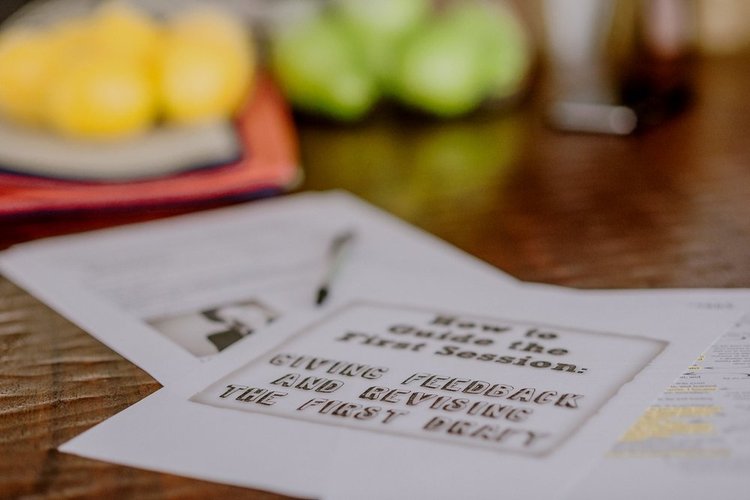
Our blog has practical guides on the personal statement, supplemental essays, paying for college, and more.
Video Courses

Comprehensive live and on-demand courses to keep you on track. Most are pay-what-you-can, so anyone can join.
One-on-One Support

Want more personalized help? We've got free and paid options. Schedule a call with us to find out more.
When it comes to college admissions, we pretty much have all the things.

College Application Hub
- Essay examples
- Brainstorming exercises
- Supplemental essay guides

Upcoming Webinars
- Weekly AMAs
- Interviews with experts
- Professional development for counselors

YouTube Channel
- Application advice
- Interview guidance
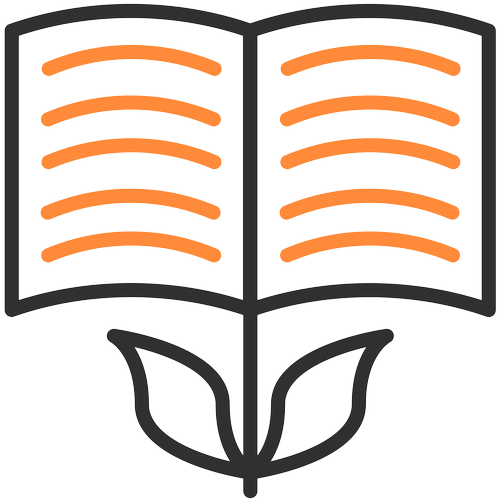
College Essay Guy Blog
- How-to guides for colleges
- Resources for every part of the application process
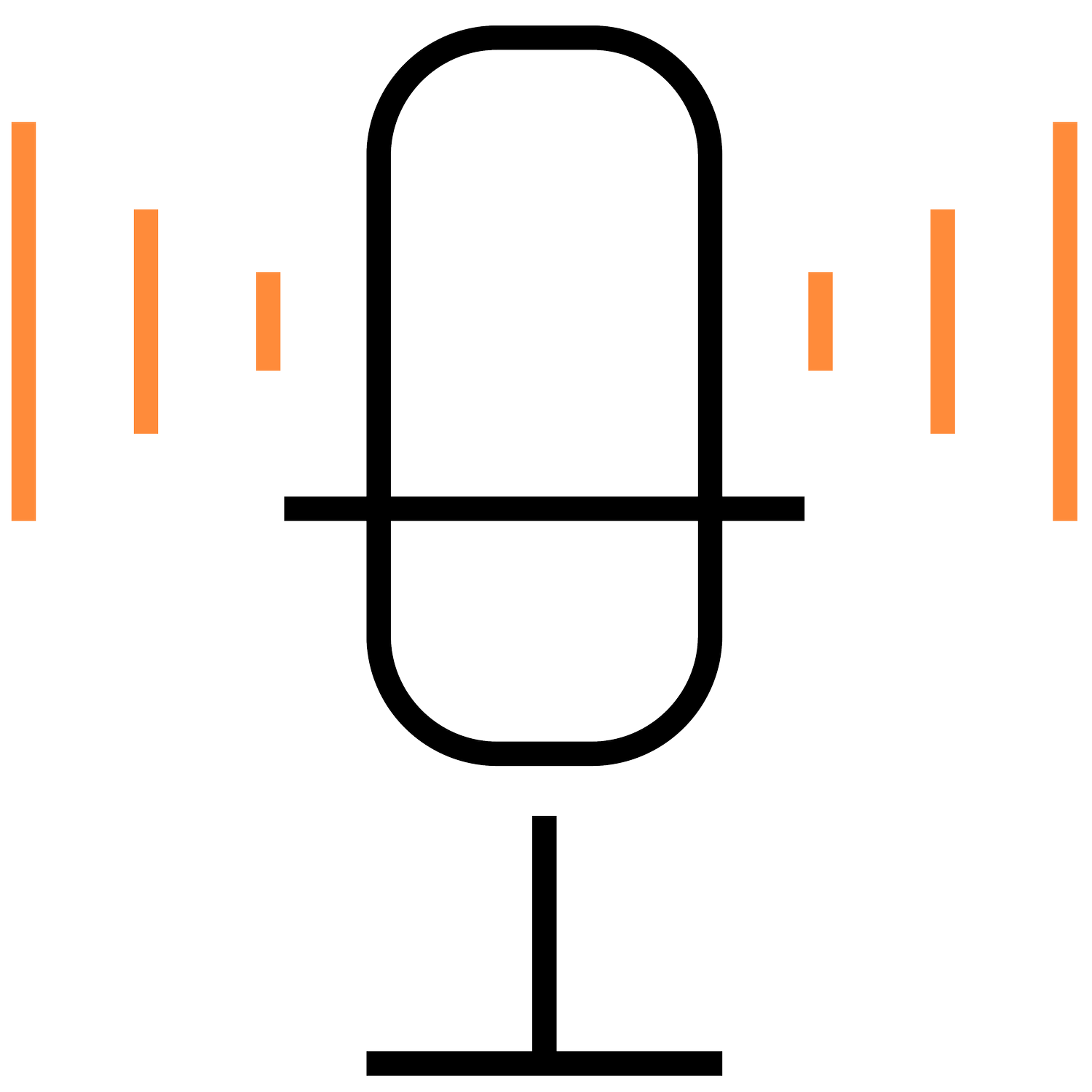
- Industry-leading experts
- Building your college list
- Behind the scenes of an admission office
Most of our courses are Pay-what-you-can—which means anyone can join.
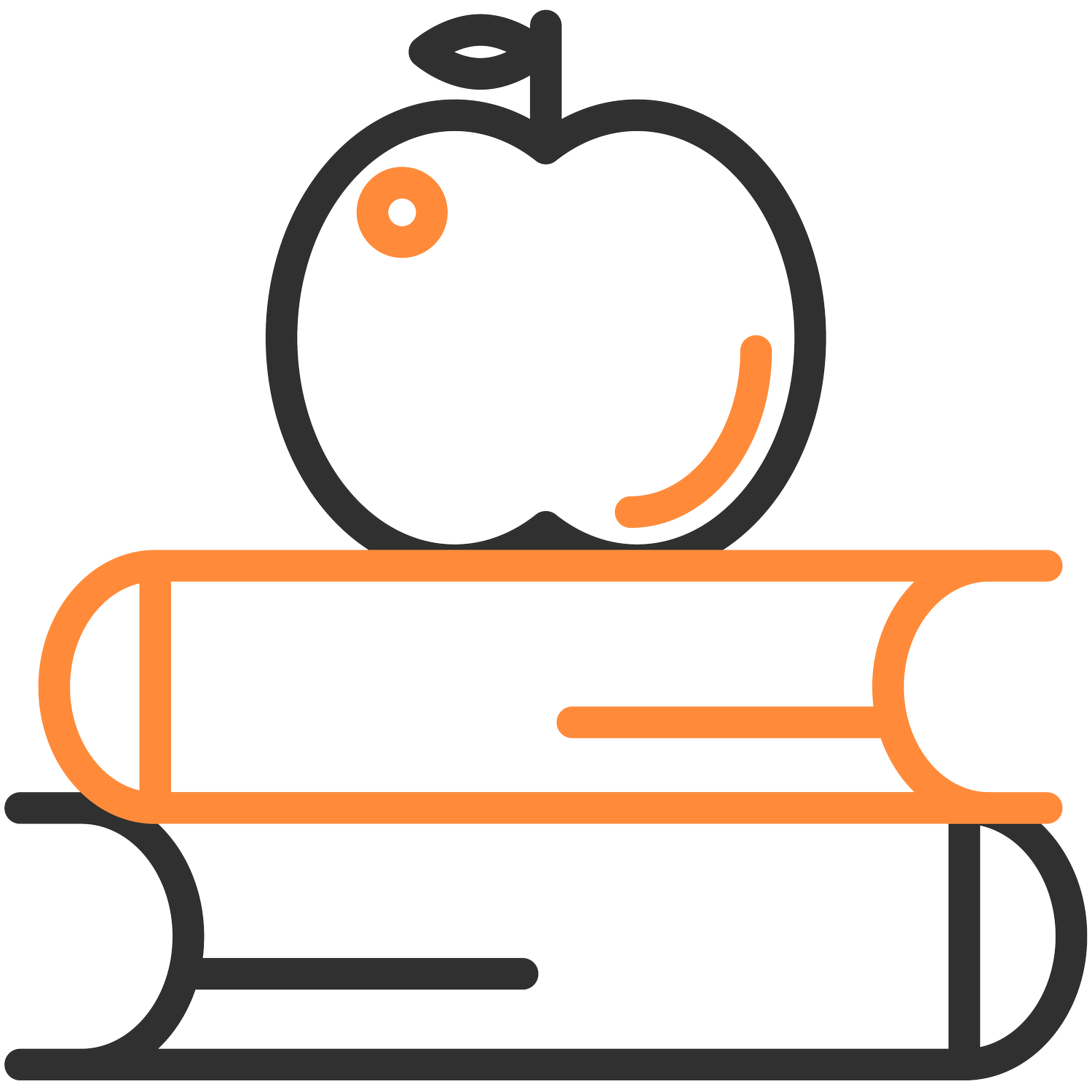
All Student Courses
- Join live or watch OnDemand
- Personal statement
- College application
- Applying to selective colleges
- College List Building
- Advanced Courses

All Counselor Courses
- Join live or OnDemand
- Comprehensive professional development
- Applications & supplemental essays
- Working one-on-one
- Workshops and small groups
Meet with an experienced essay specialist or counselor. Receive personalized, comprehensive support. Get all your questions answered.

College Essay Guy believes that every student should have access to the tools and guidance necessary to create the best application possible. That's why we're a one-for-one company, which means that for every student who pays for support, we provide free support to a low-income student.

The Matchlighters Scholars Program pairs high-achieving students from low-income households with experienced college counselors.
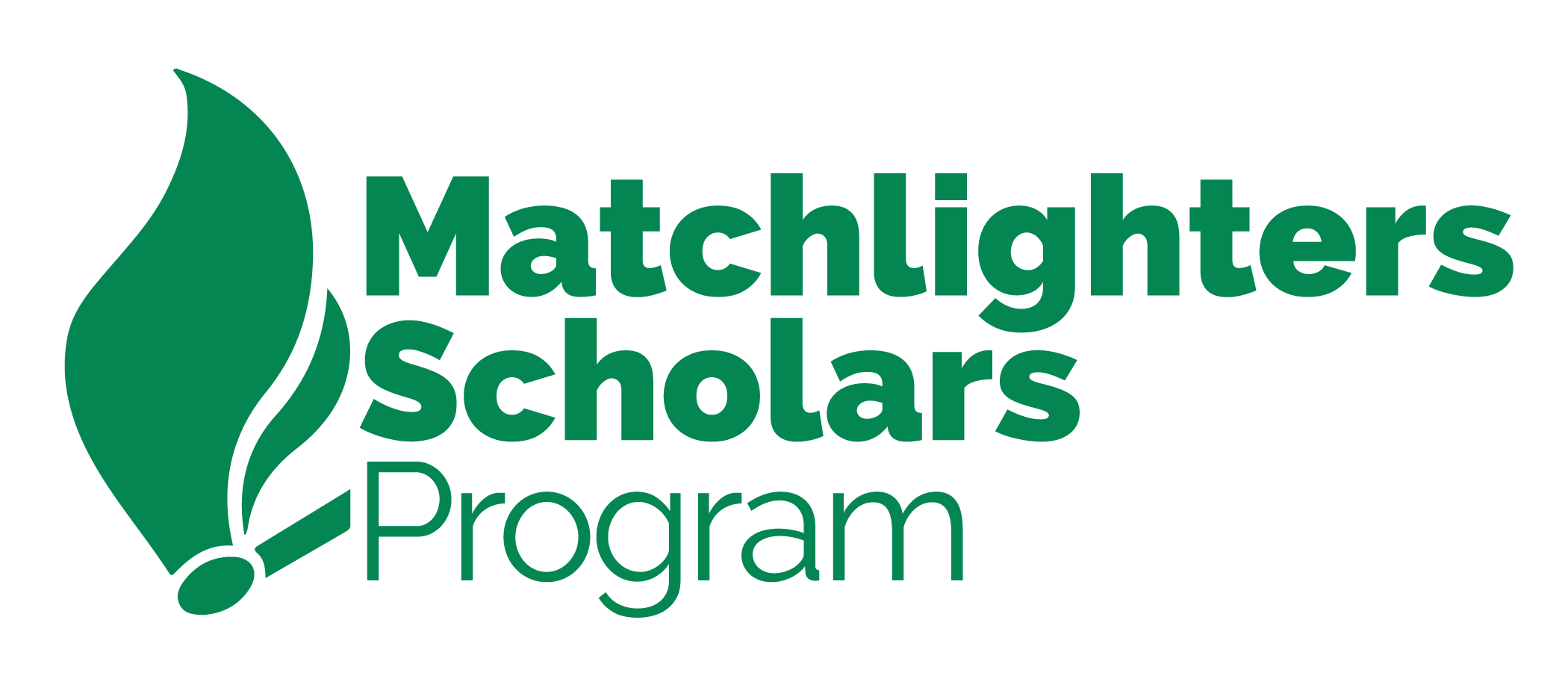
College Essay Guy offers tons of free and paid resources and professional development opportunities for college counselors working in high schools, community based organizations, or independent practices.
Free resources for counselors.

- Application checklists and monthly email templates
- Step-by-step guides
- Resources just for counselors working in high schools and CBOs
Online Video Courses

- Starting at $597 (or pay-what-you-can)
- Personal statement, supplemental essays, UC personal insight questions, and more
- For working one-on-one or in groups
Workshops & Speaking Events
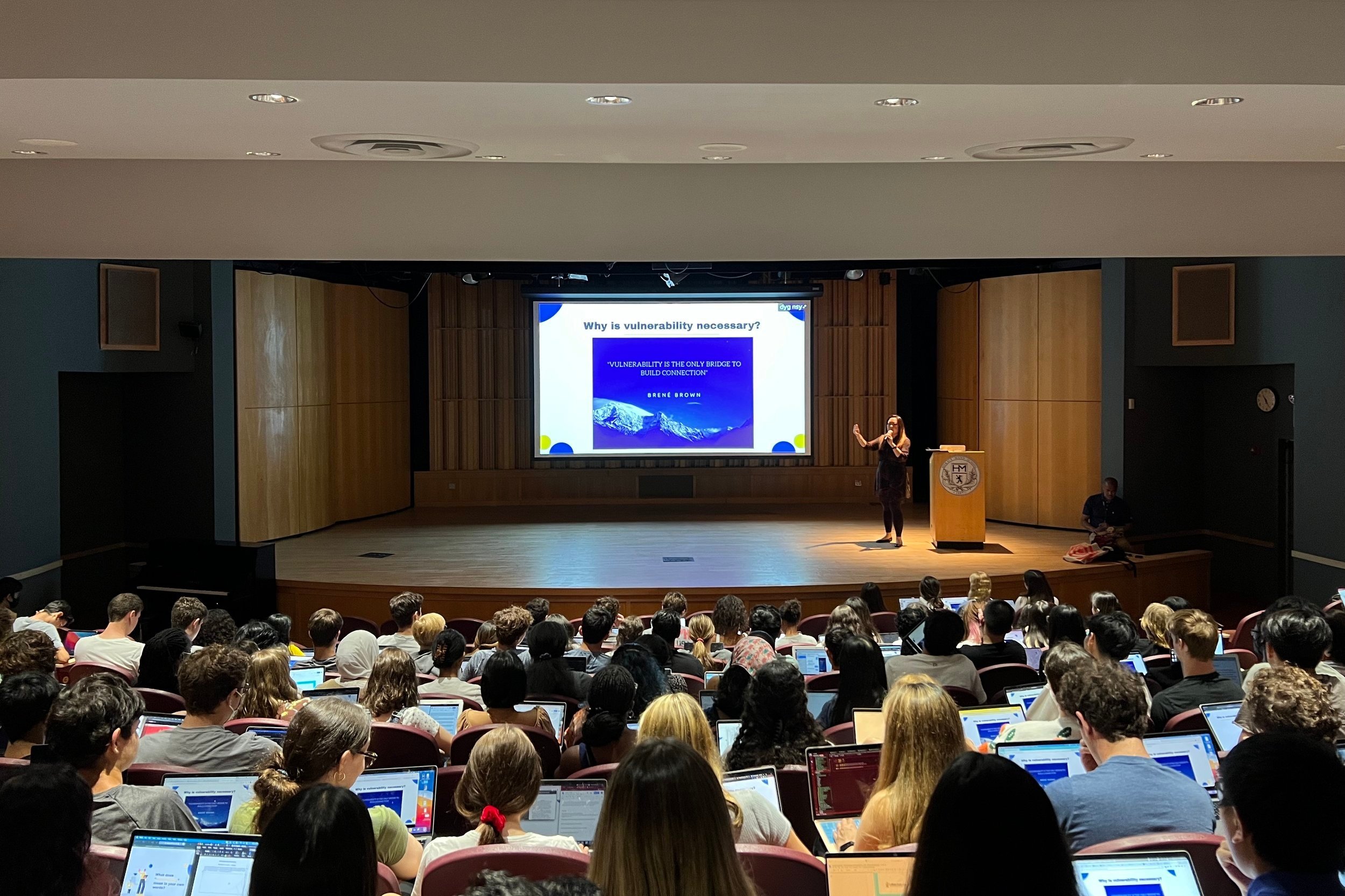
- Led by trained workshop facilitators—from 30 to 300 students
- Personal statement, supplemental essays, UC PIQ’s and more
- Mix-and-match presentation topics
Essay Writing Curriculum

- Two private, live training sessions with your team
- A schedule of daily assignments with interactive exercises that help foster moments of self-discovery
- Designed specifically for teachers, high school and CBO college counselors

Parent Community
- Meet with college counseling and admissions experts
- Live weekly sessions
- Detailed calendar
- Get your questions answered
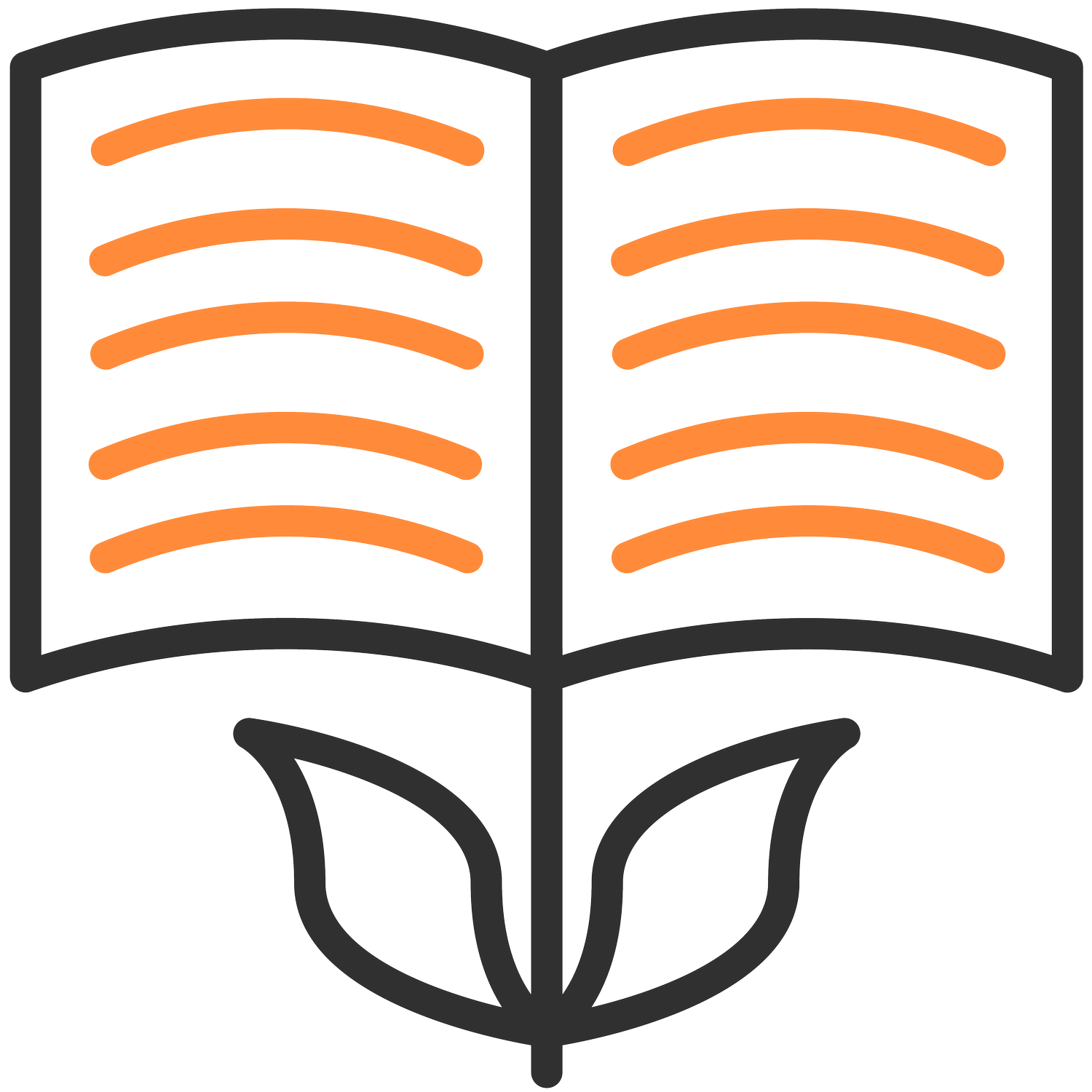
Family Handbook
- 37-page guide
- College List-Building
- Financial Aid
- Standardized Tests

Purdue Online Writing Lab Purdue OWL® College of Liberal Arts
Welcome to the Purdue Online Writing Lab

Welcome to the Purdue OWL
This page is brought to you by the OWL at Purdue University. When printing this page, you must include the entire legal notice.
Copyright ©1995-2018 by The Writing Lab & The OWL at Purdue and Purdue University. All rights reserved. This material may not be published, reproduced, broadcast, rewritten, or redistributed without permission. Use of this site constitutes acceptance of our terms and conditions of fair use.
The Online Writing Lab (the Purdue OWL) at Purdue University houses writing resources and instructional material, and we provide these as a free service at Purdue. Students, members of the community, and users worldwide will find information to assist with many writing projects. Teachers and trainers may use this material for in-class and out-of-class instruction.
The On-Campus and Online versions of Purdue OWL assist clients in their development as writers—no matter what their skill level—with on-campus consultations, online participation, and community engagement. The Purdue OWL serves the Purdue West Lafayette and Indianapolis campuses and coordinates with local literacy initiatives. The Purdue OWL offers global support through online reference materials and services.
Social Media
Facebook twitter.

- Deakin Home
- Student news
- StudentConnect
- Help and contact us
Essay writing
When writing an essay, don't be tempted to simply summarise other writers' ideas. It is your discussion of the topic and your analysis of their ideas that should form the backbone of your essay.
- What is an essay?
- Expectations
- Linking ideas
- The writing process
An essay is a type of assignment in which you present your point of view on a single topic through the analysis and discussion of academic sources. Usually, an essay has the format of an introduction, body paragraphs and a conclusion.
Critical analysis is essential to essay writing. One way you can demonstrate this is by summarising and paraphrasing other writers and by comparing, contrasting and evaluating their ideas. You can use this analysis to construct your own opinions, questions or conclusions.
When writing an essay, you need to have a clear position on a topic (sometimes called a thesis statement) in the introduction. You then support your thesis statement in the body of the essay, using relevant ideas and evidence from appropriate sources . It is important that you present your own ideas, opinions and analyses throughout your essay. When you use someone else’s ideas, you must correctly acknowledge it through referencing .
Essay writing is different to:
- reflective writing , which is based primarily on your personal experiences
- report writing , which focuses primarily on reporting facts and making recommendations.
What will my marker be looking for in my essay?
If in doubt, ask early! Your lecturer and tutor are there to help – and you can always ask for further advice from a Writing Mentor or a Language and Learning Adviser . In general, your marker will be looking for evidence that you have:
- Answered the essay question directly.
- Met the assignment criteria.
- Drawn on discussions from weekly seminars and classes (your unit’s weekly topics should be your guide for all of your assessments).
- Provided a position on, and shown understanding of, the topic.
- Completed the set and recommended readings.
- Discussed and analysed sources and formatted them in the required referencing style.
- Planned your essay so that is readable, clear and logically sequenced and with a distinct introduction, body and conclusion.
- Kept within the set word limit.
How much should I write?
Again, always consult your unit guide and assessment instructions for exact details of your assignment. These should clearly state the required word count for your assignment. Do not go dramatically under or over this amount. Usually about 10% over or under is acceptable – but always check with your lecturer first.
Planning your essay well before the due date will result in less stress and also less time writing, as you will know exactly how many words you need for each section. If you use the introduction, body and conclusion model, it is recommended to have one main idea per body paragraph . For example, if you have to write a 1000-word essay you might have three body paragraphs of approximately 250 words each, leaving 125 words for both the introduction and the conclusion.
A reference list or bibliography – formatted according to your referencing style – on a separate page at the end of your essay is also usually required. Normally this is not included in the word count but check with your lecturer or tutor to be sure.
Below are some ideas for structuring your essay. You should always check the assignment criteria and other information in your unit site for specific requirements. If you are not sure, you should ask your lecturer or tutor. You can also get further advice from a writing mentor or a Language and Learning Adviser .
Try to begin and end each paragraph with your own thoughts rather than quoting or paraphrasing someone else’s words. Remember that your marker will be looking for your opinion, your discussion and your analysis of ideas.
The introduction
Remember that these are the first words your marker will read so always try to make a great first impression to ensure that you provide your marker with a clear and accurate outline of what is to follow in your essay. Don’t go into too much detail in the introduction. Save the detail for the body of your essay. You should try to include the following:
- Provide background information about the topic. Introduce and define some of the key concepts discussed in the essay.
- Respond directly to the essay question and clearly state what your essay intends to achieve.
- Provide an overview of some of the main points, or direction, of the essay.
- Be sure to revise the introduction in your final draft so that it accurately reflects any changes you may have made to the body and conclusion of your essay.
Body paragraphs
- Start each paragraph with a topic sentence. This is the main point of your paragraph and everything within this paragraph should relate back to it.
- Each main point should be relevant to your essay question or thesis statement.
- Integrate evidence and examples into your paragraph from your readings to support your point. Do not simply present evidence but analyse it at each stage, always relating it back to your assignment question.
- Be formal, objective and cautious in your writing.
- All sources must be cited in text in the referencing style required by your unit (citations are also listed in a bibliography or reference list at the end of the essay).
- Consider how you conclude your paragraph and how you might link it to the following paragraph.
The conclusion
Conclusions are primarily for summing up what you have presented in the body of your essay. No new information is presented in the conclusion. Use synonyms and paraphrasing so that you do not repeat all your main points word for word.
- Summarise your argument and draw on some of the main points discussed in the body of the essay but not in too much detail.
- Tell your reader how your essay has successfully responded to the essay question.
- You may return to discuss the background/context of the topic, if relevant.
- Where you see a gap in knowledge, you might provide suggestions for further research (optional).
Reference list or bibliography
- Create a reference list or bibliography – with full bibliographic details – according to the referencing style required by your unit.
Linking words clarify for the reader how one point relates to another. An essay flows cohesively when ideas and information relate to each other smoothly and logically.
Here are some common linking words used to:
- Introduce and add ideas firstly, secondly, finally, also, another, too, moreover, furthermore, as well as
- Illustrate ideas for example, to demonstrate this
- Show a result or effect accordingly, therefore, as a result, thus, in order for this to occur
- Compare ideas similarly, likewise
- Contrast ideas in contrast, however, but, in comparison, despite, on one hand ... on the other hand ...
- Restate and clarify in other words, to put this another way, this could also be defined as
- Sum up or conclude therefore, so, to summarise, to conclude, in conclusion, finally
You should also avoid repeating key names and words too many times. Instead, use pronouns that refer back to earlier key words. For example: it, they, their, this, these, that, those
Further examples of linking words in academic writing:
Common linking words , University of Wisconsin Academic phrasebank , Manchester University
Planning and researching
- Use the Deakin Assignment Planner to get a better idea of the time required to complete your essay.
- Watch video - Analyse the assignment question .
- Stuck? Ask your tutor or Study Support.
- Gather relevant information and supporting evidence from class notes and readings.
- Make further notes about any questions you have.
- Researching involves sourcing texts appropriate to your task.
- Use a variety of reading strategies .
- Take notes always with the assignment question in mind.
Initial writing
- It is important to begin writing as soon as soon as possible – think of writing as a process rather than a goal.
- Write an answer to the question in just one or two sentences – this can form the basis your thesis statement or argument.
- Plan and structure the body paragraphs of your essay into topic sentences with bullet points for each paragraph.
- Expand on each bullet point to build paragraphs based on evidence, - this will also require citations .
- Be formal, objective and cautious in your writing.
- Integrate your sources with your own analysis.
- After reviewing the plan and draft of body paragraphs, write the introduction and conclusion.
Drafting, reviewing and proofreading
- Take a break for at least a day and come back with a fresh pair of eyes.
- Review the marking criteria and assignment instructions again. Ask yourself: Have I done everything required?
- Draft and re-draft your essay.
- Read the paper aloud to find errors in sentence structure and word choice and refine it so there is a more natural flow.
- Save a back-up copy of each draft – and in more than one place!
- Get help with writing and referencing from Study Support .
- Don’t leave adding citations and references until the final draft – it can be very time consuming.
- Proofread your essay and make sure it follows any formatting requirements required by the unit.
- Ensure your referencing is correct and consistent.
- Save a back-up copy of your final essay before submitting your assignment!
- Submit your assignment according to your unit’s instructions.
Guide to essay paragraph structure
Access the guide here

You might also like:
- Evaluating sources
- Critical thinking, reading and note taking
- Academic style
- Drafting your assignment
Book an appointment with a language and learning adviser; or First Nations students can book with the First Nations academic support links
- Book an appointment
- First Nations Academic Support bookings
- Email First Nations Academic Support
We use cookies to improve your experience. You consent to the use of our cookies if you proceed. Visit our Privacy policy for more information.

Tips for Online Students , Tips for Students
How To Write An Essay: Beginner Tips And Tricks
Updated: June 19, 2024
Published: June 22, 2021

Many students dread writing essays, but essay writing is an important skill to develop in high school, university, and even into your future career. By learning how to write an essay properly, the process can become more enjoyable and you’ll find you’re better able to organize and articulate your thoughts.
When writing an essay, it’s common to follow a specific pattern, no matter what the topic is. Once you’ve used the pattern a few times and you know how to structure an essay, it will become a lot more simple to apply your knowledge to every essay.
No matter which major you choose, you should know how to craft a good essay. Here, we’ll cover the basics of essay writing, along with some helpful tips to make the writing process go smoothly.

Photo by Laura Chouette on Unsplash
Types of Essays
Think of an essay as a discussion. There are many types of discussions you can have with someone else. You can be describing a story that happened to you, you might explain to them how to do something, or you might even argue about a certain topic.
When it comes to different types of essays, it follows a similar pattern. Like a friendly discussion, each type of essay will come with its own set of expectations or goals.
For example, when arguing with a friend, your goal is to convince them that you’re right. The same goes for an argumentative essay.
Here are a few of the main essay types you can expect to come across during your time in school:
Narrative Essay
This type of essay is almost like telling a story, not in the traditional sense with dialogue and characters, but as if you’re writing out an event or series of events to relay information to the reader.
Persuasive Essay
Here, your goal is to persuade the reader about your views on a specific topic.
Descriptive Essay
This is the kind of essay where you go into a lot more specific details describing a topic such as a place or an event.
Argumentative Essay
In this essay, you’re choosing a stance on a topic, usually controversial, and your goal is to present evidence that proves your point is correct.

Expository Essay
Your purpose with this type of essay is to tell the reader how to complete a specific process, often including a step-by-step guide or something similar.
Compare and Contrast Essay
You might have done this in school with two different books or characters, but the ultimate goal is to draw similarities and differences between any two given subjects.
The Main Stages of Essay Writing
When it comes to writing an essay, many students think the only stage is getting all your ideas down on paper and submitting your work. However, that’s not quite the case.
There are three main stages of writing an essay, each one with its own purpose. Of course, writing the essay itself is the most substantial part, but the other two stages are equally as important.
So, what are these three stages of essay writing? They are:
Preparation
Before you even write one word, it’s important to prepare the content and structure of your essay. If a topic wasn’t assigned to you, then the first thing you should do is settle on a topic. Next, you want to conduct your research on that topic and create a detailed outline based on your research. The preparation stage will make writing your essay that much easier since, with your outline and research, you should already have the skeleton of your essay.
Writing is the most time-consuming stage. In this stage, you will write out all your thoughts and ideas and craft your essay based on your outline. You’ll work on developing your ideas and fleshing them out throughout the introduction, body, and conclusion (more on these soon).
In the final stage, you’ll go over your essay and check for a few things. First, you’ll check if your essay is cohesive, if all the points make sense and are related to your topic, and that your facts are cited and backed up. You can also check for typos, grammar and punctuation mistakes, and formatting errors.
The Five-Paragraph Essay
We mentioned earlier that essay writing follows a specific structure, and for the most part in academic or college essays , the five-paragraph essay is the generally accepted structure you’ll be expected to use.
The five-paragraph essay is broken down into one introduction paragraph, three body paragraphs, and a closing paragraph. However, that doesn’t always mean that an essay is written strictly in five paragraphs, but rather that this structure can be used loosely and the three body paragraphs might become three sections instead.
Let’s take a closer look at each section and what it entails.
Introduction
As the name implies, the purpose of your introduction paragraph is to introduce your idea. A good introduction begins with a “hook,” something that grabs your reader’s attention and makes them excited to read more.
Another key tenant of an introduction is a thesis statement, which usually comes towards the end of the introduction itself. Your thesis statement should be a phrase that explains your argument, position, or central idea that you plan on developing throughout the essay.
You can also include a short outline of what to expect in your introduction, including bringing up brief points that you plan on explaining more later on in the body paragraphs.
Here is where most of your essay happens. The body paragraphs are where you develop your ideas and bring up all the points related to your main topic.
In general, you’re meant to have three body paragraphs, or sections, and each one should bring up a different point. Think of it as bringing up evidence. Each paragraph is a different piece of evidence, and when the three pieces are taken together, it backs up your main point — your thesis statement — really well.
That being said, you still want each body paragraph to be tied together in some way so that the essay flows. The points should be distinct enough, but they should relate to each other, and definitely to your thesis statement. Each body paragraph works to advance your point, so when crafting your essay, it’s important to keep this in mind so that you avoid going off-track or writing things that are off-topic.
Many students aren’t sure how to write a conclusion for an essay and tend to see their conclusion as an afterthought, but this section is just as important as the rest of your work.
You shouldn’t be presenting any new ideas in your conclusion, but you should summarize your main points and show how they back up your thesis statement.
Essentially, the conclusion is similar in structure and content to the introduction, but instead of introducing your essay, it should be wrapping up the main thoughts and presenting them to the reader as a singular closed argument.

Photo by AMIT RANJAN on Unsplash
Steps to Writing an Essay
Now that you have a better idea of an essay’s structure and all the elements that go into it, you might be wondering what the different steps are to actually write your essay.
Don’t worry, we’ve got you covered. Instead of going in blind, follow these steps on how to write your essay from start to finish.
Understand Your Assignment
When writing an essay for an assignment, the first critical step is to make sure you’ve read through your assignment carefully and understand it thoroughly. You want to check what type of essay is required, that you understand the topic, and that you pay attention to any formatting or structural requirements. You don’t want to lose marks just because you didn’t read the assignment carefully.
Research Your Topic
Once you understand your assignment, it’s time to do some research. In this step, you should start looking at different sources to get ideas for what points you want to bring up throughout your essay.
Search online or head to the library and get as many resources as possible. You don’t need to use them all, but it’s good to start with a lot and then narrow down your sources as you become more certain of your essay’s direction.
Start Brainstorming
After research comes the brainstorming. There are a lot of different ways to start the brainstorming process . Here are a few you might find helpful:
- Think about what you found during your research that interested you the most
- Jot down all your ideas, even if they’re not yet fully formed
- Create word clouds or maps for similar terms or ideas that come up so you can group them together based on their similarities
- Try freewriting to get all your ideas out before arranging them
Create a Thesis
This is often the most tricky part of the whole process since you want to create a thesis that’s strong and that you’re about to develop throughout the entire essay. Therefore, you want to choose a thesis statement that’s broad enough that you’ll have enough to say about it, but not so broad that you can’t be precise.
Write Your Outline
Armed with your research, brainstorming sessions, and your thesis statement, the next step is to write an outline.
In the outline, you’ll want to put your thesis statement at the beginning and start creating the basic skeleton of how you want your essay to look.
A good way to tackle an essay is to use topic sentences . A topic sentence is like a mini-thesis statement that is usually the first sentence of a new paragraph. This sentence introduces the main idea that will be detailed throughout the paragraph.
If you create an outline with the topic sentences for your body paragraphs and then a few points of what you want to discuss, you’ll already have a strong starting point when it comes time to sit down and write. This brings us to our next step…
Write a First Draft
The first time you write your entire essay doesn’t need to be perfect, but you do need to get everything on the page so that you’re able to then write a second draft or review it afterward.
Everyone’s writing process is different. Some students like to write their essay in the standard order of intro, body, and conclusion, while others prefer to start with the “meat” of the essay and tackle the body, and then fill in the other sections afterward.
Make sure your essay follows your outline and that everything relates to your thesis statement and your points are backed up by the research you did.
Revise, Edit, and Proofread
The revision process is one of the three main stages of writing an essay, yet many people skip this step thinking their work is done after the first draft is complete.
However, proofreading, reviewing, and making edits on your essay can spell the difference between a B paper and an A.
After writing the first draft, try and set your essay aside for a few hours or even a day or two, and then come back to it with fresh eyes to review it. You might find mistakes or inconsistencies you missed or better ways to formulate your arguments.
Add the Finishing Touches
Finally, you’ll want to make sure everything that’s required is in your essay. Review your assignment again and see if all the requirements are there, such as formatting rules, citations, quotes, etc.
Go over the order of your paragraphs and make sure everything makes sense, flows well, and uses the same writing style .
Once everything is checked and all the last touches are added, give your essay a final read through just to ensure it’s as you want it before handing it in.
A good way to do this is to read your essay out loud since you’ll be able to hear if there are any mistakes or inaccuracies.
Essay Writing Tips
With the steps outlined above, you should be able to craft a great essay. Still, there are some other handy tips we’d recommend just to ensure that the essay writing process goes as smoothly as possible.
- Start your essay early. This is the first tip for a reason. It’s one of the most important things you can do to write a good essay. If you start it the night before, then you won’t have enough time to research, brainstorm, and outline — and you surely won’t have enough time to review.
- Don’t try and write it in one sitting. It’s ok if you need to take breaks or write it over a few days. It’s better to write it in multiple sittings so that you have a fresh mind each time and you’re able to focus.
- Always keep the essay question in mind. If you’re given an assigned question, then you should always keep it handy when writing your essay to make sure you’re always working to answer the question.
- Use transitions between paragraphs. In order to improve the readability of your essay, try and make clear transitions between paragraphs. This means trying to relate the end of one paragraph to the beginning of the next one so the shift doesn’t seem random.
- Integrate your research thoughtfully. Add in citations or quotes from your research materials to back up your thesis and main points. This will show that you did the research and that your thesis is backed up by it.
Wrapping Up
Writing an essay doesn’t need to be daunting if you know how to approach it. Using our essay writing steps and tips, you’ll have better knowledge on how to write an essay and you’ll be able to apply it to your next assignment. Once you do this a few times, it will become more natural to you and the essay writing process will become quicker and easier.
If you still need assistance with your essay, check with a student advisor to see if they offer help with writing. At University of the People(UoPeople), we always want our students to succeed, so our student advisors are ready to help with writing skills when necessary.
In this article
At UoPeople, our blog writers are thinkers, researchers, and experts dedicated to curating articles relevant to our mission: making higher education accessible to everyone.
Don't have an Account?
Register Now!

Essay Writing Center
The Student Essay Writing Center provides you with help and advice in an easy-to-read and understandable format. Essay writing can be difficult, but it doesn't have to be. This resource is designed to make essay writing doable — even fun and exciting! Here you will learn how to brainstorm, write, structure, and revise your essay so that you can stand out from your peers.
There are many different types of essay writing and, depending on what you are writing for, the format and approach can change. We’ve designed our Essay Writing Center to provide you with key tips and pointers so that you can get started in the right direction — no matter if your essay is designed to persuade the college admissions team that you’re the right candidate, if you are making your case to win a scholarship, or simply if you are looking for help with your homework.
Essay Writing Help and Guidance
Our Essay Writing Help and Advice pages are designed to help you get practical guidance on how to construct your essay, what to include, useful tips and much more. To get started, choose the essay intent to get started
General Essay Writing
Writing an effective essay is about more than just the words you use. No matter how well-spelled or elegantly combined the words you use are, to be able to effectively communicate your essays you must also follow a few simple guidelines regarding structure and organization. Practice makes perfect and with these tools at your disposal you will be well on your way towards creating excellent essays in no time! Read more
Admission Essay Writing
Admissions counselors use the college essay as an opportunity to learn about the student beyond GPA and SAT scores. With some admissions counselors reading more than 2,000 essays each year, it’s important to understand how to write a great college essay that showcases who you are. Your essay should create an emotional connection so that your essay is memorable and sets you apart from other applicants. Read more
Scholarship Essay Writing
Getting scholarship money to help fund your education should be a priority, but scholarships are extremely competitive and difficult to get. One of the most important parts of your application is the essay—it is here where you demonstrate your creativity and how you plan to further promote the initiatives by the funding organization. Not sure where to begin? Our eight steps can help you write a better scholarship essay. Read more
Sample Essays
It is helpful to get advice on how to write a good essay, but seeing these tools applied in practice can really cement your understanding. Our Sample Essay section can help you scribble your way to an excellent essay, where you can find essays for college admissions, medical school, business school, law school, and even scholarship essays. Once you see these sample essays, you will be well on your way to writing a winning essay! Read more
Get the International Student newsletter!

Santa Clarita Valley's #1 Local News Source
6 best essay writing services for students – legit paper writing services online, sponsored post.
- July 10, 2024
Writing essays can be an exciting task for students if they have enough time to conduct research to pen down an insightful piece of writing. But that isn’t the case most of the time, right?
With so much to take care of to maintain their work-life balance, finding time to sit down and finish their essay writing assignments can become a bit hard at times. They have to manage their quizzes, assignments, and social life, all at once.
Given that, looking out for a reliable ally to help with essay writing is always a better step to consider. Although there is a huge number of online websites that claim to offer top-notch essay writing, only some are actually legit and trustworthy.
Finding legitimate essay writing services isn’t easy, so we did the hard work for students. We’ve tried and tested several online services and in this article, we will recommend only the ones that met our strict criteria.
The Top Essay Writing Services We Recommend
| MyPerfectPaper.net | Produces the highest quality content | $11/page | 9.5 |
| SharkPapers.com | Best for complex papers | $14.03/page | 9.4 |
| CollegeEssay.org | Specializes in college essays | $11/page | 9.3 |
| WriteMyEssay.help | Best value for money | $11/page | 9.2 |
| MyPerfectWords.com | Packed with features | $11/page | 9.1 |
| 5StarEssays.com | Best known for timely deliveries | $14.03/page | 9.0 |
How We Filtered the Best Essay Writing Services for Students
We know how important it is for students to find a reliable service, especially when their grades are at stake. Here’s how we carefully selected the top services:
We Conducted Extensive Research
Our first step was thorough research. We looked at many websites, read numerous reviews, and checked out forums and student feedback platforms. This helped us create an initial list of services that seemed promising based on their reputation and user experiences.
Strict Criteria for Selection
To make sure only the best services made it to our final list, we used strict criteria based on several key factors:
- Quality of Writing : We focused on services that deliver well-written, original, and insightful content. We reviewed samples from each service to check for clarity, coherence, and academic quality.
- Customer Service : Good customer service is what every student needs. We tested each service’s support by asking questions and requesting help to see how quickly and effectively they responded.
- Pricing : We compared prices to see if the services offered good value for money. While affordability was important, we also considered the balance between cost and quality.
- Writer Expertise : We looked at the qualifications and expertise of the writers. We preferred services that employed experienced writers with advanced degrees in various fields.
- Delivery Time : Meeting deadlines is crucial for students. We evaluated how well each service stuck to deadlines and their ability to handle urgent requests without sacrificing quality.
- Revisions and Guarantees : Services offering free revisions and quality guarantees were given higher preference, as these policies show a commitment to customer satisfaction.
After narrowing down our list, we placed orders with each service. We assessed the entire process, from placing the order to receiving the final product. This hands-on approach allowed us to directly experience the level of service, quality of writing, and overall reliability of each provider.
Let’s introduce our readers to the top recommended essay writing services!
MyPerfectPaper.net: Best Choice for The High- Quality Essays
Among the many services we tried and tested, MyPerfectPaper.net stood out to us the most. We found that this paper writing service offers solid quality, especially if students need high-standard papers.
Here are the top features that make them our top recommendation:
Quality of Writing
The trustworthy writers at this service deliver some of the best work we’ve seen. Their papers are well-structured, insightful, and error-free. The writers clearly understand academic standards, and we’re confident that their content is relevant and well-researched.
Customer Service
Their customer service is responsive and helpful. They answer questions quickly and are available to help with any concerns. We contacted them even at odd hours and the support team was happy to respond and address our concerns.
Another commendable feature is that their prices are reasonable for the high quality of work they provide. They offer a good balance between cost and quality, making it a worthwhile choice for students who want well-crafted essays.
Writer Expertise
The writers at MyPerfectPaper.net are highly qualified, with many holding advanced degrees in their fields. This expertise shows in the detailed and accurate essays they produce. The service carefully matches writers to assignments based on their expertise so every essay is written in the best possible way.
Delivery Time
MyPerfectPaper.net is great at meeting deadlines, even for urgent requests. They know how important it is for students to get their essays on time and make it a priority to deliver completed work on schedule. We’re happy to share that every order we placed was delivered before the given deadline.
Revisions and Guarantees
MyPerfectPaper.net offers free revisions up to 14 days, which is a big plus. If someone needs any changes, they are quick to make adjustments so that the final product meets expectations. Their satisfaction guarantee shows their commitment to delivering quality work.
Overall Rating: 9.5
MyPerfectPaper.net has earned an impressive overall rating of 9.5 from our team of reviewers. We’re happy to say that their writers are competent enough to deliver the best quality essays out of any writing service we tested.
SharkPapers.com: Best for Complex Papers
When it comes to handling challenging academic assignments, SharkPapers.com shines as an excellent choice. This essay writing service is among our top recommendations because of strong reasons. Their writing experts have a history of helping students who belong to higher levels of study such as graduate, post-graduate, and doctoral levels.
Obviously, we were able to make keen observations about why they are rated high by students.
Expert Writers with Advanced Skills
Their team consists of writers with advanced degrees and extensive experience. Our interactions with their writers highlighted their ability to confidently handle complex assignments and deliver accurate and well-researched content.
Specialization in Complex Topics
SharkPapers.com specializes in handling complex topics such as artificial intelligence, data science, cyber security, data engineering, quantum computing, and more. They stay current with these advanced topics, making them an excellent option for students studying these modern subjects.
Customized Approach to Each Project
SharkPapers.com impressed us with its personalized approach to each project. They tailored their writing to fit specific academic requirements and our individual needs. Every writing task we assigned their experts was delivered to us with a customized approach.
Timely Delivery and Reliability
During our evaluation, they consistently met deadlines for our complex assignments. We got our essays done on time thanks to their swift delivery options. Students can choose their rush order delivery and get them to write essays in as quick as 6 hours!
Overall Rating: 9.4
SharkPapers.com has earned a remarkable overall rating of 9.4 from our team of reviewers. We were impressed by their expertise in tackling complex papers and their commitment to delivering quality and reliable service. This makes them a great choice for students in advanced studies.
CollegeEssay.org: Specializes in College Essays
In reviewing CollegeEssay.org, our team found their standout feature to be their ability to create essays that truly reflect each student’s unique journey and ambitions. Here’s why we recommend this essay writing service online based on some distinctive strengths:
Tailored Essays for Personalized Impact
CollegeEssay.org stands out for its personalized approach to crafting college essays. They have a knack for capturing the individual strengths and aspirations of each student. Among all the orders we placed, every essay was distinctive and unique.
Insightful Approach to College Admissions
Their team brings a deep understanding of college admissions, highlighting a student’s qualities and experiences through engaging narratives. During our review, we observed how they skillfully translate these aspects into essays that make an impression on admissions committees.
Personalized and Authentic Writing
We were impressed by CollegeEssay.org’s commitment to authenticity in essay writing. They steer clear of generic content. Rest assured that each essay is creatively tailored to reflect the student’s personality and achievements. Also, there was no sign of plagiarism, and we verified that through Turnitin.
Supportive Guidance and Reliable Service
CollegeEssay.org provides excellent 24/7 customer support and timely delivery of essays. They also offer personalized guidance throughout the essay writing process. Student fulfillment is their top priority, which is backed by their satisfaction guarantee.
Transparent Pricing
Students will find straightforward pricing at CollegeEssay.org with no surprises. They provide clear, upfront costs for their services without any hidden fees. The final payment of our order was exactly in line with what their price calculator showed when the essay was ordered. This transparency makes it easy for students to budget and plan their expenses.
Overall Rating: 9.3
CollegeEssay.org earns a solid overall rating of 9.3 from our team of reviewers. Their expertise lies in crafting personalized and impactful college essays. This combined with their strong commitment to authenticity makes them a solid choice for college students.
WriteMyEssay.help: Best Value for Money
Among our top recommendations is WriteMyEssay.help, renowned for offering the best value for money in essay writing services. Here’s why we highly recommend this “ write my essay ” service:
Affordable Pricing with Quality Assurance
WriteMyEssay.help stands out for its affordable pricing starting from $11 per page, making them accessible to students on a budget. During our review, we were impressed by their ability to maintain high-quality standards despite their competitive pricing.
Transparent and Honest Pricing Structure
They offer a transparent pricing structure and there are no hidden costs or surprises. This transparency allows students to plan their budgets effectively without compromising on the quality of the essays they receive.
Commitment to Customer Satisfaction
WriteMyEssay.help prioritizes customer satisfaction by offering reliable support and prompt responses to queries. Their commitment to making sure that every student receives quality work at affordable prices sets them apart in the industry.
Timely Delivery and Flexibility
We found WriteMyEssay.help to be dependable in meeting deadlines, even for urgent assignments. Their flexibility in accommodating student timelines without compromising on the quality of work underscores their dedication to customer satisfaction.
Overall Rating: 9.2
WriteMyEssay.help earns an impressive overall rating of 9.3 from our team of reviewers. Their combination of affordable pricing, quality assurance, and customer satisfaction guarantee makes them an ideal choice for students seeking value and reliability in essay writing services.
MyPerefectWords.com: Most Feature-Rich Essay Writing Service
Another top essay writing platform that we would happily recommend is MyPerfectWords.com. They have a proven track record of helping students score top grades. The unique selling point of this essay writing service for students is the number of features it offers.
250+ Professional Writers
MyPerfectWords.com has over 250 professional writers ready to help with essays on various subjects and levels of difficulty. During our review, we saw how they matched each assignment with a writer who knew the subject well.
Flexible Payment Options
They offer a convenient 50/50 payment plan. Students can pay half upfront and the rest when the essay is done, and they’re happy with it. This helps them manage their budget and guarantees they get what they need before paying in full.
Strict Anti-Plagiarism Policy
MyPerfectWords.com is serious about originality. They have strict rules against plagiarism, so every essay they deliver is unique and meets academic standards without any copied content. Every essay comes with a complimentary plagiarism report, so students can have peace of mind knowing that their submissions are 100% unique.
No AI, Just Human Writers
This essay writing service guarantees that no AI programs are involved—just real people writing essays. We verified the expertise and educational backgrounds of the writers we interacted with. Also, the papers we received were passed through smart AI content detectors, and we were not able to detect any AI written content whatsoever!
Handles All Types of Essays
Whether someone needs a narrative essay, research paper, or any other type of academic writing, MyPerfectWords.com can help. They’re experts in different types of essays, and papers and make sure that each one meets their academic requirements and expectations.
Overall Rating: 9.1
We would rate MyPerfectWords.com at 9.1/10. They have earned a solid rating from our team because they really care about quality. They offer so many helpful features and make sure every essay they write meets the standards and what students need.
5StarEssays.com: Best Known For Timely Deliveries
If students are looking for a service to address their “ write my essay online ” concerns, we would recommend they check out 5StarEssays.com. This writing platform constantly delivers quality essays on time and the prices are easy on the pocket too!
Quick Delivery Options
At 5StarEssays.com, they offer rapid delivery options including 3-hour, 6-hour, and 12-hour deadlines. During our evaluation, we found they consistently meet these tight timelines without compromising quality.
Wide Range of Academic Services
5StarEssays.com provides a comprehensive array of academic writing services beyond essay writing. They cover everything from research papers and term papers to dissertations and thesis writing, ensuring they meet diverse academic needs.
Expert Writers Across Various Subject
The platform has a team of expert writers with specialized knowledge across various subjects. Whether it’s humanities, sciences, or business studies, they have writers capable of delivering insightful and well-researched content for all students.
Responsive Customer Support
5StarEssays.com offers responsive customer support available 24/7. Their team is dedicated to addressing student inquiries promptly and ensuring a smooth experience throughout the writing process. Their support team was responding to our queries actively throughout the writing process.
Quality Assurance
They have a rigorous quality assurance process in place to make certain every essay meets high academic standards. This includes thorough proofreading, editing, and plagiarism checks to deliver polished and original work.
Overall Rating: 9.0
5StarEssays.com earns a commendable overall rating of 9.0 from our team. Their reputation for prompt deliveries, coupled with their reliability and commitment to customer satisfaction, is why we are more than happy to recommend it to students.
The Best Essay Writing Services for Students: Conclusion
Choosing the right essay writing service can be challenging, as each platform has its strengths and limitations. When choosing one, student’s choices should align closely with their specific academic needs and preferences.
Here are our top contenders for the best essay writing services in 2024:
- MyPerfectPaper.net (9.5/10)
- SharkPapers.com (9.4/10)
- CollegeEssay.org (9.3/10)
- WriteMyEssay.help (9.2/10)
- MyPerfectWords.com (9.1/10)
- 5StarEssays.com (9.0/10)
Each service offers unique features and benefits, from high-quality writing and timely deliveries to personalized support and competitive pricing. To find the best fit, consider reading customer reviews, comparing prices, and verifying the qualifications of the writers.
Ultimately, the best essay writing service is the one that meets the specific requirements and ensures students receive top-notch academic assistance.
Related To This Story
Is dapp good for your startup’s supply chain, how a startup can integrate crypto into its operations, 4 strategies for managing growth and maintaining momentum for your trading business, 3 essential digital marketing strategies for trading startups, how to make profitable trades in a fast-paced market, how to start an e-commerce business in germany: a comprehensive guide for 2024, latest news.

Deputies receive reports of person with gun

Photos: Concerts in the Park Linkin Park Tribute

Photos: Celebrate series Cuba

No transports in collision involving pedestrian

10-acre fire contained overnight
Sign up for the, morning rundown.
Filled with the top stories to start your day, and emergency news alerts.

25060 Avenue Stanford, St. 141
Valencia, CA, 91355
Main Desk: 661-259-1234
Newsroom: 661-255-1234
Advertising: 661-287-5564
Have a news tip? Let us know!
News Sections
- Coronavirus
- Environment
- Politics & Government
More Sections
- Video + Podcasts
- Sunday Signal
- Subscribe to Print
- Classified Ads
- Event Calendar
The Personal Statement Topics Ivy League Hopefuls Should Avoid
- Share to Facebook
- Share to Twitter
- Share to Linkedin
Yale University
A compelling personal statement is a critical component of an Ivy League application, as it offers students the unique opportunity to showcase their personality, experiences, and aspirations. Kickstarting the writing process in the summer can give students a critical advantage in the admissions process, allowing them more time to brainstorm, edit, and polish standout essays. However, as students begin drafting their essays this summer, they should bear in mind that selecting the right topic is crucial to writing a successful essay. Particularly for students with Ivy League aspirations, submitting an essay that is cliche, unoriginal, or inauthentic can make the difference between standing out to admissions officers or blending into the sea of other applicants.
As ambitious students embark on the college application process, here are the personal statement topics they should avoid:
1. The Trauma Dump
Many students overcome significant hurdles by the time they begin the college application process, and some assume that the grisliest and most traumatic stories will attract attention and sympathy from admissions committees. While vulnerability can be powerful, sharing overly personal or sensitive information can make readers uncomfortable and shift focus away from a student’s unique strengths. Students should embrace authenticity and be honest about the struggles they have faced on their path to college, while still recognizing that the personal statement is a professional piece of writing, not a diary entry. Students should first consider why they want to share a particular tragic or traumatic experience and how that story might lend insight into the kind of student and community member they will be on campus. As a general rule, if the story will truly enrich the admissions committee’s understanding of their candidacy, students should thoughtfully include it; if it is a means of proving that they are more deserving or seeking to engender pity, students should consider selecting a different topic. Students should adopt a similar, critical approach as they write about difficult or sensitive topics in their supplemental essays, excluding unnecessary detail and focusing on how the experience shaped who they are today.
2. The Travelogue
Travel experiences can be enriching, but essays that merely recount a trip to a foreign country without deeper reflection often fall flat. Additionally, travel stories can often unintentionally convey white saviorism , particularly if students are recounting experiences from their charity work or mission trips in a foreign place. If a student does wish to write about an experience from their travels, they should prioritize depth not breadth—the personal statement is not the place to detail an entire itinerary or document every aspect of a trip. Instead, students should focus on one specific and meaningful experience from their travels with vivid detail and creative storytelling, expounding on how the event changed their worldview, instilled new values, or inspired their future goals.
3. The Superhero Narrative
Ivy League and other top colleges are looking for students who are introspective and teachable—no applicant is perfect (admissions officers know this!). Therefore, it’s crucial that students be aware of their strengths and weaknesses, and open about the areas in which they hope to grow. They should avoid grandiose narratives in which they cast themselves as flawless heroes. While students should seek to put their best foot forward, depicting themselves as protagonists who single-handedly resolve complex issues can make them appear exaggerated and lacking in humility. For instance, rather than telling the story about being the sole onlooker to stand up for a peer being bullied at the lunch table, perhaps a student could share about an experience that emboldened them to advocate for themselves and others. Doing so will add dimension and dynamism to their essay, rather than convey a static story of heroism.
Best High-Yield Savings Accounts Of 2024
Best 5% interest savings accounts of 2024, 4. the plan for world peace.
Similarly, many students feel compelled to declare their intention to solve global issues like world hunger or climate change. While noble, these proclamations can come across as unrealistic and insincere, and they can distract from the tangible achievements and experiences that a student brings to the table. Instead, applicants should focus on demonstrable steps they’ve taken or plan to take within their local community to enact positive change, demonstrating their commitment and practical approach to making a difference. For instance, instead of stating a desire to eradicate poverty, students could describe their extended involvement in a local charity and how it has helped them to discover their values and actualize their passions.
5. The Sports Story
While sports can teach valuable lessons, essays that focus solely on athletic achievements or the importance of a particular game can be overdone and lack depth. Admissions officers have read countless essays about students scoring the winning goal, dealing with the hardship of an injury, or learning teamwork from sports. Students should keep in mind that the personal essay should relay a story that only they can tell—perhaps a student has a particularly unique story about bringing competitive pickleball to their high school and uniting unlikely friend groups or starting a community initiative to repair and donate golf gear for students who couldn’t otherwise afford to play. However, if their sports-related essay could have been written by any high school point guard or soccer team captain, it’s time to brainstorm new ideas.
6. The Pick-Me Monologue
Students may feel the need to list their accomplishments and standout qualities in an effort to appear impressive to Ivy League admissions officers. This removes any depth, introspection, and creativity from a student’s essay and flattens their experiences to line items on a resume. Admissions officers already have students’ Activities Lists and resumes; the personal statement should add texture and dimension to their applications, revealing aspects of their character, values and voice not otherwise obvious through the quantitative aspects of their applications. Instead of listing all of their extracurricular involvements, students should identify a particularly meaningful encounter or event they experienced through one of the activities that matters most to them, and reflect on the ways in which their participation impacted their development as a student and person.
7. The Pandemic Sob Story
The Covid-19 pandemic was a traumatic and formative experience for many students, and it is therefore understandable that applicants draw inspiration from these transformative years as they choose their essay topics. However, while the pandemic affected individuals differently, an essay about the difficulties faced during this time will likely come across as unoriginal and generic. Admissions officers have likely read hundreds of essays about remote learning challenges, social isolation, and the general disruptions caused by Covid-19. These narratives can start to blend together, making it difficult for any single essay to stand out. Instead of centering the essay on the pandemic's challenges, students should consider how they adapted, grew, or made a positive impact during this time. For example, rather than writing about the difficulties of remote learning, a student could describe how they created a virtual study group to support classmates struggling with online classes. Similarly, an applicant might write about developing a new skill such as coding or painting during lockdown and how this pursuit has influenced their academic or career goals. Focusing on resilience, innovation, and personal development can make for a more compelling narrative.
Crafting a standout personal statement requires dedicated time, careful thought, and honest reflection. The most impactful essays are those that toe the lines between vulnerability and professionalism, introspection and action, championing one’s strengths and acknowledging weaknesses. Starting early and striving to avoid overused and unoriginal topics will level up a student’s essay and increase their chances of standing out.

- Editorial Standards
- Reprints & Permissions

Making Academic Writing More Engaging
James lang's "writing like a teacher" offers a path to more engaging prose..
Posted July 11, 2024 | Reviewed by Devon Frye
- The Challenges of Infidelity
- Take our Relationship Satisfaction Test
- Find counselling near me
- Transitioning from academic writing to writing for the public can be challenging.
- James Lang, author of "Cheating Lessons," addresses this challenge in an upcoming book.
- The book, "Writing Like a Teacher," provides valuable advice for academics seeking to improve their writing.
When James M. Lang published the book On Course in 2008 and garnered notable success, his editor invited him to dinner. She suggested that Lang might be interested in writing a book about cheating. Initially reluctant, Lang’s interest was piqued after an incident with one of his students. He agreed to write a book on cheating, which was subsequently published.
Cheating Lessons: Learning from Academic Dishonesty is, I believe, Lang’s magnum opus. In it, he established his signature interdisciplinary structure, drawing from various disciplines, including science, literature, and psychology. The book was a great success, allowing Lang to share his ideas at universities as far away as Jordan and with organizations like the United Nations. As Lang wrote in an email to me: “ Cheating Lessons literally opened up the world to me. Because academic dishonesty occurs in every higher education system, colleges and universities are always looking for new ways to understand and address it.”
As a student, I agree with Lang. Whenever I entertain the idea of cheating, it is because I do not understand the material. If I master the material, the notion of cheating never even crosses my mind. Lang has correctly diagnosed the cheating predicament and offers an excellent solution: designing lessons that are student-centric. When students master the material and take charge of their learning, they are less likely to think about cheating.
Lang is a professor at the University of Notre Dame and a regular columnist at The Chronicle of Higher Education . But he is, first and foremost, a compulsive writer. “Compulsive” is his word to describe his writing regimen. In his email, he stated: “The way I think through problems is by writing about them. I write all the time, both because I find it fulfilling and because I use writing to make sense of my experiences, both within and outside of higher education.”
Many writers can resonate with the idea that engaging with the world through writing makes the world real. As I often say, if I do not see it in writing, it does not exist for me.
Lang is a rare breed among writers, having published books with Harvard University Press and articles in popular journals such as The Chronicle of Higher Education . He has the mind of a formidable scholar and the temperament of an indefatigable journalist. His writing is heavily based on personal experiences, making it engaging and compelling. Readers become interested not only in his ideas but also in their progenitor.
I came across Lang’s writings through my writing mentor, John Trimble, a professor emeritus at The University of Texas at Austin. Lang published a rave review of Trimble’s opus, Writing with Style , titled “A Classic ‘Nontextbook’ on Writing.” Trimble shared the review of Lang with me and said, “Lang has quite an Internet presence—and life.”
After battling a severe case of myocarditis in late 2021, Lang faced significant health challenges, including pneumonia and a stroke during heart transplant surgery. Despite these obstacles, he made a near-miraculous recovery with the support of Tufts Medical Center, therapists, and his family. This experience renewed his commitment to writing, education, and philanthropy, allowing him to return to his professional endeavors.
I was delighted to learn that Lang is writing a book on the art and craft of writing, slated for publication in April 2025. While Trimble argues that writers should aim not to impress but to serve readers, Lang takes this a step further, suggesting that writers should teach readers. There is a critical need for academics to learn how to write plain, clear, and readable prose. Writing like teachers is an effective approach because most academic writers are, first and foremost, teachers.
The title of Lang's forthcoming book is Writing Like a Teacher: Expanding Audiences for Nonfiction Writing . Lang identifies the need: “Many faculty members want to expand the audiences for their research and ideas and become more public scholars. But they seem to have trouble transitioning from traditional academic writing to writing that appeals to readers outside their discipline.”

The solution, he believes, is to: “Translate the teaching principles that guide you in the classroom—where you are also educating non-experts—into your writing practices. Simply put: write like a teacher.”
Why would Lang take on this book? As he says in his email, “I have been writing about teaching for a long time, but my original interest was in writing, and I taught writing for almost three decades. This book marries my two longstanding interests: teaching and writing.” I agree with the need, the solution, and the choice of author.
As an international scholar and multilingual learner who has studied at the University of Miami, the University of Pennsylvania, and the University of Minnesota, I have encountered many scholars who write obtuse, turgid, and incomprehensible academic prose. Some academic writers want to become public scholars but struggle to write clear, plain, and readable prose. I argue that they need to learn from both Trimble and Lang.
Trimble believes the problem is that most academic writers did not receive interlinear emendations to model clear, readable prose. He argued that we write what we read, just as we are what we eat.
Lang also identified a crucial issue: traditional academics struggle to transition because they lack the skill of good writing. But Lang is a facile writer who practices what he preaches. I've learned much about good writing from reading his books and paying attention to how he puts ideas into words. Writing Like a Teacher taps into what academics already know, and then teaching them a new skill is an effective way to address this problem. My Ph.D. advisor told me he thinks of himself as a teacher first and a writer second, so he would be delighted to read a book that capitalizes on that notion.
I believe academic authors have a duty to be inclusive in their scholarship. As an international scholar and multilingual learner, I find it challenging to understand scholarship written in jargon. I prefer prose like Lang’s and Trimble’s, which is clear and accessible.
There is a misconception that readable prose is “dumbed down,” but that is incorrect. Another misconception is that jargon-filled prose is “deep thought,” which is also incorrect. There is no correlation between the difficulty of the writing and the depth of the thought.
I never have to re-read any of Lang's sentences, which means he takes great care to make his prose clear, plain, and readable. Writers owe it to their readers to be clear. As Trimble argues in Writing With Style , readers are impatient to get the goods and begrudge any author who makes them work hard to get them.
I believe that Writing Like a Teacher will be a welcome addition to the genre of good writing for academics. In the field of law, there is a robust movement for "plain English," where legal jargon is frowned upon. I argue that we need a similar movement in academia, where obtuse jargon is frowned upon.
As E. B. White said, “Since writing is communication, clarity can only be a virtue. And although there is no substitute for merit in writing, clarity comes closest to being one. Even to a writer who is being intentionally obscure or wild of tongue, we can say, ‘Be obscure clearly! Be wild of tongue in a way we can understand!’”
The world of academia would be a better place if all scholars committed to clear prose. Following E. B. White’s maxim, we ask them to deploy jargon clearly. We are not asking them to stop using technical terms. Rather, we are asking them to write technical yet readable prose.
The problem with unclear writing is often not diction but syntax. As William Beeman, a linguist at the University of Minnesota, argued, some languages are heavily syntax-based, while others have freer syntax because words are inflected for their function. Latin, for example, has almost free syntax due to extensive inflection. English, like Chinese, is heavily syntax-dependent and has far less inflection. Therefore, the issue with unclear writing lies in syntax and structure.
As George Gopen, professor emeritus at Duke University, stated in The Sense of Structure : "In writing, as in real estate, the most important factor is location, location, location." I agree with him because I was able to write clear prose by mastering the syntactical structure of English sentences. It is the key to writing clear English prose. As a non-native English writer, in my eighth year of writing in English, if I can learn to write clear prose, then my native English counterparts absolutely can. The key is in the structure.

Abdulrahman Bindamnan is a Ph.D. student at the University of Minnesota and an ICGC scholar at the Interdisciplinary Center for Global Change.
- Find a Therapist
- Find a Treatment Center
- Find a Psychiatrist
- Find a Support Group
- Find Online Therapy
- International
- New Zealand
- South Africa
- Switzerland
- Asperger's
- Bipolar Disorder
- Chronic Pain
- Eating Disorders
- Passive Aggression
- Personality
- Goal Setting
- Positive Psychology
- Stopping Smoking
- Low Sexual Desire
- Relationships
- Child Development
- Self Tests NEW
- Therapy Center
- Diagnosis Dictionary
- Types of Therapy

Sticking up for yourself is no easy task. But there are concrete skills you can use to hone your assertiveness and advocate for yourself.
- Emotional Intelligence
- Gaslighting
- Affective Forecasting
- Neuroscience
- Skip to main content
- Skip to main navigation
Student Motivation in the Classroom
Extrinsic vs. intrinsic motivation: what's the difference and why should you care.
Instructors want their students motivated to complete coursework, pay attention in class, study for an exam, seek additional help when needed, or more generally, succeed. Here, as in all discussions of motivation, the distinction between extrinsic and intrinsic motivation matters. Intrinsic motivation can be defined (with several assumptions that are still up for debate) simply as “a desire to engage in an activity for its own sake – that is, just because of the satisfaction it provides.” Conversely, extrinsic motivation is the desire or necessity to engage in a task because of some externally controlled stimuli (Kohn, 1993).
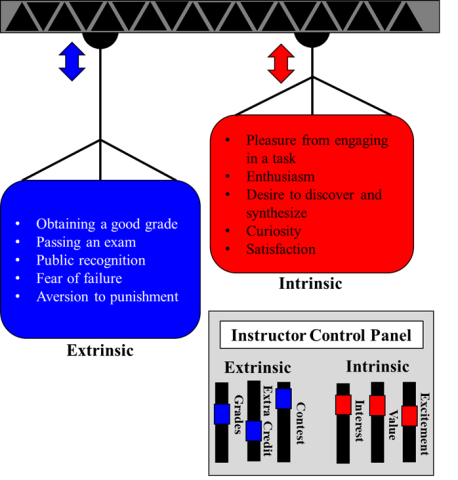
Figure 1. Extrinsic vs. intrinsic factors that influence motivation. As instructors, we have control over how these factors are leveraged in the classroom.
Figure 1 illustrates typical factors in the classroom that would align with extrinsic motivation (blue), such as achieving a particular letter grade, and intrinsic motivation (red), such as an inherent curiosity for a particular subject.
Extrinsic Motivation: Potential Pitfalls
Extrinsic motivators—especially grades—often drive students to complete coursework and study for exams. But extrinsic motivation can also work at cross-purposes with deep learning. Although some instructors seek to completely remove grading as an extrinsic factor (the ATL’s teaching guide on Ungrading ), most instructors will have to compromise with, rather than eliminate, extrinsic motivation. Kohn provides notable tips in his landmark book, Punished by Rewards (1993), on how to “minimize the damage” of extrinsic factors when they must be used:
- Don't make it a contest. Competing with other students for a fixed number of rewards (i.e. grading on a bell curve) is a recipe for classroom hostility and rivalry.
- Be respectful and discrete in meting out rewards. Placing too much public emphasis on the value of an extrinsic motivator can undermine intrinsic motivation for the student receiving the reward as well as those who don’t.
- Remind students that the extrinsic reward is not the focus. A student may rightfully feel proud after earning an A+ on an exam, but if we’ve constructed our learning objectives and assessment methods correctly, that A+ really means they’ve developed a deeper knowledge and understanding of the subject matter. Place the emphasis on that knowledge.
Intrinsically Motivated Students: The Benefits
Scholars debate the relationship between intrinsic and extrinsic motivation, but the former is clearly conducive to graduating lifelong learners that will continue the pursuit of knowledge long after they’ve received their last letter grade (McCombs, 1991). More specifically, many studies highlight the positive outcomes associated with intrinsically motivated students in the classroom, such as:
- Lower levels of student stress (Baker, 2004)
- Greater student autonomy and goal attainment (Conti, 2000)
- A higher degree of self-regulation and confidence in achieving academic goals (Alt, 2016)
- Increased likelihood of taking a deeper approach in learning, i.e. more robust connections between knowledge (Everaert et al., 2017)
- Placing greater value on tasks being asked of them (Pucher et al., 2003)
Students will exhibit differing levels of baseline intrinsic motivation regarding a particular topic; after all, students narrow the scope of their college education in selecting a degree program, and there are bound to be some areas in which they’re innately less interested in. Intrinsic motivation is not immutable, however, and instructors can the nurture the right forms of motivation and exploit the associated benefits. What’s more, we can do so through fairly straightforward and practical approaches.
What Can You Do?
As instructors, we have the ability to nurture, or at the very least do no harm to, a student’s sense of intrinsic motivation throughout a course, from the wording used in constructing the syllabus to the way in which we present a topic.
Rethinking Syllabus Language
The syllabus is likely the first thing the students will encounter at the outset of the course and should be viewed as a critical opportunity to make a first impression. What sort of impression should we make? Should we welcome the students to our course and express excitement for our time together, or explicitly detail all rewards they’ll receive if they meet our expectations and the punishments meted out if they don’t? Contrary to viewing the syllabus as a legally binding document in which all contingencies are explicitly accounted for, Mano Singham suggests that we be concise, transparent, and genuinely excited in our syllabi, emphasizing why the journey (the topic we’re teaching) is worth the pursuit (Singham, 2007). Harnish and Bridges showed that the use of warm, friendly language in a syllabus improves a student’s outlook on the course and instructor (Harnish & Bridges, 2011). Stressing the importance of congruency between an instructor’s syllabus language and self-perception Richmann and colleagues demonstrate that the emotional associations of syllabus language can be quantified (Richmann et al., 2020). This can be extended further by shifting to a learning-based syllabus that places the emphasis on how students will develop rather than the traditional content-and-policy approach (Palmer et al., 2016). In short:
- Use welcoming language and relaxed language . Consider running your syllabus through the ATL’s syllabus language algorithm to measure this.
- Show enthusiasm for your topic in your syllabus . Emphasize why the particular subject matter in your course is worth the investment.
- Be concise . Avoid syllabus creep, that is, expanding the syllabus to account for every contingency. It’s ok to reference other material without including it in the syllabus.
- Be transparent with your students . You’ve taken great care to outline the structure and path of your course in the syllabus. Don’t be afraid to explain why it is the way it is.
Interacting with Your Students (Respectfully)
An instructor’s general disposition can have notable implications on the student’s experience. Instructors that exhibit a more approachable and friendly persona, through verbal and non-verbal language, can be less intimidating to students and encourage a relationship of trust between the student and instructor (Cotten & Wilson, 2006). Conversely, students are less likely to approach an instructor whose tone is distant or hostile, hurting their motivation to seek help during the course. In short:
- Be professional, polite, and approachable with your students . If you have doubts regarding your ability to objectively measure this, consider having a colleague observe some of your classes.
- Avoid appearing too busy or distracted for your students . You may need to rush out of the room right after class (perhaps to teach another class), but make sure your students are able to reach you at other times.
- Show an interest in your students . Making casual small-talk before and after class can help put students at ease. Send emails when students have missed class, to congratulate them for strong work, or to offer assistance when they are struggling. Remember that you’re a person and so are they.
Keep Things Interesting
Instructors who are required to teach a broad range of topics are likely to find some subjects inherently more pleasurable to teach, and that’s ok; however, if we don’t show an interest in the topic we’re teaching, it is unreasonable to ask our students to do so, and even more unreasonable to expect them to be intrinsically motivated to learn. Forsyth and McMillan (1991) present practical tips to avoid this and capitalize on intrinsic motivation:
- Pique your students’ curiosity . Introduce each topic in an informative and challenging way. Consider posing a question or utilizing a “brain dump” (i.e. have all the students take 30 seconds to write down everything they currently know about a topic) to get your students thinking (Miller, 2022).
- Present the material at a challenging level . Avoid patronizing students. Frequent low-stakes quizzing (see Formative Assessment ) can help gauge where your students are at and help craft lessons at the appropriate level.
- Show enthusiasm in what you’re teaching and what your students are learning . Avoid reading directly from notes and don’t be afraid to vary forms of instruction.
- Place some of the responsibility for learning back on the students . Offering students a choice in their learning experience, i.e. which topics to explore in more depth and methods of evaluation, allows students a greater degree of autonomy and fosters a greater degree of intrinsic motivation.
Student motivation, whether the motivation to simply attend class or to pursue lifelong learning, is a complex but critical aspect in a student achieving the learning outcomes of any course, and each instructor has the ability to integrate it within their greater teaching philosophy. The level of effort this will involve will inevitably vary across instructors and disciplines, but if the range of literature discussed here is a fair indication, the higher education community at larger stands to benefit from its consideration.
Alt, D. (2016). Contemporary constructivist practices in higher education settings and academic motivational factors. Australian Journal of Adult Learning , 56 (3), 374–399.
Baker, S. R. (2004). Intrinsic, Extrinsic, and Amotivational Orientations: Their Role in University Adjustment, Stress, Well-Being, and Subsequent Academic Performance. Current Psychology: Learning , 23 (3), 189–202.
Conti, R. (2000). College goals: Do self-determined and carefully considered goals predict intrinsic motivation, academic performance, and adjustment during the first semester? Social Psychology of Education , 4 (2), 189–211. https://doi.org/10.1023/A:1009607907509
Cotten, S. R., & Wilson, B. (2006). Student-faculty interactions: Dynamics and determinants. Higher Education , 51 (4), 487–519. https://doi.org/10.1007/s10734-004-1705-4
Everaert, P., Opdecam, E., & Maussen, S. (2017). The relationship between motivation, learning approaches, academic performance and time spent. Accounting Education , 26 (1), 78–107. https://doi.org/10.1080/09639284.2016.1274911
Forsyth, R. D., & McMillan, H. J. (1991). Practical Proposals for Motivating Students. New Directions for Teaching and Learning , 45 , 53–65.
Harnish, R. J., & Bridges, K. R. (2011). Effect of syllabus tone: Students’ perceptions of instructor and course. Social Psychology of Education , 14 (3), 319–330. https://doi.org/10.1007/s11218-011-9152-4
Kohn, A. (1993). Punished by Rewards: The Trouble with Gold Stars, Incentive Plans, A’s, Praise, and Other Bribes . Houghton Mifflin Company.
McCombs, B. L. (1991). Motivation and lifelong learning. In Educational Psychologist (Vol. 26, Issue 2, pp. 117–127).
Miller, M. D. (2022). Remembering and Forgetting in the Age of Technology: Teaching, Learning, and the Science of Memory in a Wired World (1st Editio). West Virginia University Press.
Palmer, M. S., Wheeler, L. B., & Aneece, I. (2016). Does the Document Matter? The Evolving Role of Syllabi in Higher Education. Change: The Magazine of Higher Learning , 48 (4), 36–47. https://doi.org/10.1080/00091383.2016.1198186
Pucher, R. K., Mense, A., Wahl, H., & Schmöllebeck, F. (2003). Intrinsic motivation of students in Project Based Learning. Transactions of the South African Institute of Electrical Engineers , 94 (3), 6–9.
Richmann, C., Kurinec, C., & Millsap, M. (2020). Syllabus Language, Teaching Style, and Instructor Self-Perception: Toward Congruence. International Journal for the Scholarship of Teaching and Learning , 14 (2). https://doi.org/10.20429/ijsotl.2020.140204
Singham, M. (2007). Death to the syllabus! Liberal Education , 52–56.

Academy for Teaching and Learning
Moody Library, Suite 201
One Bear Place Box 97189 Waco, TX 76798-7189
- General Information
- Academics & Research
- Administration
- Gateways for ...
- About Baylor
- Give to Baylor
- Pro Futuris
- Social Media
- College of Arts & Sciences
- Diana R. Garland School of Social Work
- George W. Truett Theological Seminary
- Graduate School
- Hankamer School of Business
- Honors College
- Louise Herrington School of Nursing
- Research at Baylor University
- Robbins College of Health and Human Sciences
- School of Education
- School of Engineering & Computer Science
- School of Music
- University Libraries, Museums, and the Press
- More Academics
- Compliance, Risk and Safety
- Human Resources
- Marketing and Communications
- Office of General Counsel
- Office of the President
- Office of the Provost
- Operations, Finance & Administration
- Senior Administration
- Student Life
- University Advancement
- Undergraduate Admissions
- Graduate Admissions
- Baylor Law School Admissions
- Social Work Graduate Programs
- George W. Truett Theological Seminary Admissions
- Online Graduate Professional Education
- Virtual Tour
- Visit Campus
- Alumni & Friends
- Faculty & Staff
- Prospective Faculty & Staff
- Prospective Students
- Anonymous Reporting
- Annual Fire Safety and Security Notice
- Cost of Attendance
- Digital Privacy
- Legal Disclosures
- Mental Health Resources
- Web Accessibility
College of Liberal Arts and Sciences
Iowa nonfiction writing program students help judge krause essay prize.
By Charlotte Brookins
The University of Iowa Krause Essay Prize is an annual contest that has been held at the university since 2006, intended to celebrate extraordinary essays and their creators. The most recent winner is John Lee Clark , a DeafBlind essayist and poet from Minnesota, for his essay Against Access.

“I taught the class last year, so I’m very familiar with all of the nominated essays,” says Melissa Febos , bestselling author and professor in the Nonfiction Writing Program.
The class is the semester-long course entitled the Essay Prize, in which students of the Nonfiction Writing Program explore and judge nominated essays, ultimately arriving at one final winner.
“John Lee Clark’s wonderful essay had some excellent competition,” Febos continues, “but was the clear favorite in the end.”
The purpose of the Krause Essay Prize is to recognize and appreciate the work that goes into the creation of an essay, as well as showcase the genre as a form of art.
Although the prize is strictly awarded to essays, there are no specific requirements as to the medium of the essay. They can be presented in the form of the written word, film, radio, performance, or anything else that comes to mind. The Krause Essay Prize aims to stretch the definition of an essay and showcase works that are defined by what it does rather than by what it is supposed to be.
Contestants are nominated by a rotating committee of not more than fifteen writers, with nominators staying anonymous until the winner of the prize is made public. Made possible by the generous donations of the Kyle J. and Sharon Krause Family Foundation, the winning essay is awarded $10,000 and a hand-carved walnut letter box inscribed with the winner’s name and the name of their essay. The winner is also invited to a ceremony held in their honor on the University of Iowa campus.

Corey Campbell, coordinator of the Nonfiction Writing Program, says her favorite part about the contest is the appreciation it shows for essays and their creators.
“I’m drawn to the program’s deep respect for, and interest in, essaying as an art,” she says.
You can watch the full video of the latest Krause Essay Prize ceremony at Iowa. Learn more about the Krause Essay Prize by visiting, krauseessayprize.org .
Have a language expert improve your writing
Run a free plagiarism check in 10 minutes, generate accurate citations for free.
- Knowledge Base
- Academic writing
What Is Academic Writing? | Dos and Don’ts for Students
Academic writing is a formal style of writing used in universities and scholarly publications. You’ll encounter it in journal articles and books on academic topics, and you’ll be expected to write your essays , research papers , and dissertation in academic style.
Academic writing follows the same writing process as other types of texts, but it has specific conventions in terms of content, structure and style.
| Academic writing is… | Academic writing is not… |
|---|---|
Instantly correct all language mistakes in your text
Upload your document to correct all your mistakes in minutes

Table of contents
Types of academic writing, academic writing is…, academic writing is not…, useful tools for academic writing, academic writing checklist.
Academics mostly write texts intended for publication, such as journal articles, reports, books, and chapters in edited collections. For students, the most common types of academic writing assignments are listed below.
| Type of academic text | Definition |
|---|---|
| A fairly short, self-contained argument, often using sources from a class in response to a question provided by an instructor. | |
| A more in-depth investigation based on independent research, often in response to a question chosen by the student. | |
| The large final research project undertaken at the end of a degree, usually on a of the student’s choice. | |
| An outline of a potential topic and plan for a future dissertation or research project. | |
| A critical synthesis of existing research on a topic, usually written in order to inform the approach of a new piece of research. | |
| A write-up of the aims, methods, results, and conclusions of a lab experiment. | |
| A list of source references with a short description or evaluation of each source. |
Different fields of study have different priorities in terms of the writing they produce. For example, in scientific writing it’s crucial to clearly and accurately report methods and results; in the humanities, the focus is on constructing convincing arguments through the use of textual evidence. However, most academic writing shares certain key principles intended to help convey information as effectively as possible.
Whether your goal is to pass your degree, apply to graduate school , or build an academic career, effective writing is an essential skill.
Prevent plagiarism. Run a free check.
Formal and unbiased.
Academic writing aims to convey information in an impartial way. The goal is to base arguments on the evidence under consideration, not the author’s preconceptions. All claims should be supported with relevant evidence, not just asserted.
To avoid bias, it’s important to represent the work of other researchers and the results of your own research fairly and accurately. This means clearly outlining your methodology and being honest about the limitations of your research.
The formal style used in academic writing ensures that research is presented consistently across different texts, so that studies can be objectively assessed and compared with other research.
Because of this, it’s important to strike the right tone with your language choices. Avoid informal language , including slang, contractions , clichés, and conversational phrases:
- Also , a lot of the findings are a little unreliable.
- Moreover , many of the findings are somewhat unreliable.
Clear and precise
It’s important to use clear and precise language to ensure that your reader knows exactly what you mean. This means being as specific as possible and avoiding vague language :
- People have been interested in this thing for a long time .
- Researchers have been interested in this phenomenon for at least 10 years .
Avoid hedging your claims with words like “perhaps,” as this can give the impression that you lack confidence in your arguments. Reflect on your word choice to ensure it accurately and directly conveys your meaning:
- This could perhaps suggest that…
- This suggests that…
Specialist language or jargon is common and often necessary in academic writing, which generally targets an audience of other academics in related fields.
However, jargon should be used to make your writing more concise and accurate, not to make it more complicated. A specialist term should be used when:
- It conveys information more precisely than a comparable non-specialist term.
- Your reader is likely to be familiar with the term.
- The term is commonly used by other researchers in your field.
The best way to familiarize yourself with the kind of jargon used in your field is to read papers by other researchers and pay attention to their language.
Focused and well structured
An academic text is not just a collection of ideas about a topic—it needs to have a clear purpose. Start with a relevant research question or thesis statement , and use it to develop a focused argument. Only include information that is relevant to your overall purpose.
A coherent structure is crucial to organize your ideas. Pay attention to structure at three levels: the structure of the whole text, paragraph structure, and sentence structure.
| Overall structure | and a . . |
|---|---|
| Paragraph structure | when you move onto a new idea. at the start of each paragraph to indicate what it’s about, and make clear between paragraphs. |
| Sentence structure | to express the connections between different ideas within and between sentences. to avoid . |
Well sourced
Academic writing uses sources to support its claims. Sources are other texts (or media objects like photographs or films) that the author analyzes or uses as evidence. Many of your sources will be written by other academics; academic writing is collaborative and builds on previous research.
It’s important to consider which sources are credible and appropriate to use in academic writing. For example, citing Wikipedia is typically discouraged. Don’t rely on websites for information; instead, use academic databases and your university library to find credible sources.
You must always cite your sources in academic writing. This means acknowledging whenever you quote or paraphrase someone else’s work by including a citation in the text and a reference list at the end.
| In-text citation | Elsewhere, it has been argued that the method is “the best currently available” (Smith, 2019, p. 25). |
| Reference list | Smith, J. (2019). (2nd ed.). New York, NY: Norton. |
There are many different citation styles with different rules. The most common styles are APA , MLA , and Chicago . Make sure to consistently follow whatever style your institution requires. If you don’t cite correctly, you may get in trouble for plagiarism . A good plagiarism checker can help you catch any issues before it’s too late.
You can easily create accurate citations in APA or MLA style using our Citation Generators.
APA Citation Generator MLA Citation Generator
Correct and consistent
As well as following the rules of grammar, punctuation, and citation, it’s important to consistently apply stylistic conventions regarding:
- How to write numbers
- Introducing abbreviations
- Using verb tenses in different sections
- Capitalization of terms and headings
- Spelling and punctuation differences between UK and US English
In some cases there are several acceptable approaches that you can choose between—the most important thing is to apply the same rules consistently and to carefully proofread your text before you submit. If you don’t feel confident in your own proofreading abilities, you can get help from Scribbr’s professional proofreading services or Grammar Checker .
Academic writing generally tries to avoid being too personal. Information about the author may come in at some points—for example in the acknowledgements or in a personal reflection—but for the most part the text should focus on the research itself.
Always avoid addressing the reader directly with the second-person pronoun “you.” Use the impersonal pronoun “one” or an alternate phrasing instead for generalizations:
- As a teacher, you must treat your students fairly.
- As a teacher, one must treat one’s students fairly.
- Teachers must treat their students fairly.
The use of the first-person pronoun “I” used to be similarly discouraged in academic writing, but it is increasingly accepted in many fields. If you’re unsure whether to use the first person, pay attention to conventions in your field or ask your instructor.
When you refer to yourself, it should be for good reason. You can position yourself and describe what you did during the research, but avoid arbitrarily inserting your personal thoughts and feelings:
- In my opinion…
- I think that…
- I like/dislike…
- I conducted interviews with…
- I argue that…
- I hope to achieve…
Long-winded
Many students think their writing isn’t academic unless it’s over-complicated and long-winded. This isn’t a good approach—instead, aim to be as concise and direct as possible.
If a term can be cut or replaced with a more straightforward one without affecting your meaning, it should be. Avoid redundant phrasings in your text, and try replacing phrasal verbs with their one-word equivalents where possible:
- Interest in this phenomenon carried on in the year 2018 .
- Interest in this phenomenon continued in 2018 .
Repetition is a part of academic writing—for example, summarizing earlier information in the conclusion—but it’s important to avoid unnecessary repetition. Make sure that none of your sentences are repeating a point you’ve already made in different words.
Emotive and grandiose
An academic text is not the same thing as a literary, journalistic, or marketing text. Though you’re still trying to be persuasive, a lot of techniques from these styles are not appropriate in an academic context. Specifically, you should avoid appeals to emotion and inflated claims.
Though you may be writing about a topic that’s sensitive or important to you, the point of academic writing is to clearly communicate ideas, information, and arguments, not to inspire an emotional response. Avoid using emotive or subjective language :
- This horrible tragedy was obviously one of the worst catastrophes in construction history.
- The injury and mortality rates of this accident were among the highest in construction history.
Students are sometimes tempted to make the case for their topic with exaggerated , unsupported claims and flowery language. Stick to specific, grounded arguments that you can support with evidence, and don’t overstate your point:
- Charles Dickens is the greatest writer of the Victorian period, and his influence on all subsequent literature is enormous.
- Charles Dickens is one of the best-known writers of the Victorian period and has had a significant influence on the development of the English novel.
There are a a lot of writing tools that will make your writing process faster and easier. We’ll highlight three of them below.
Paraphrasing tool
AI writing tools like ChatGPT and a paraphrasing tool can help you rewrite text so that your ideas are clearer, you don’t repeat yourself, and your writing has a consistent tone.
They can also help you write more clearly about sources without having to quote them directly. Be warned, though: it’s still crucial to give credit to all sources in the right way to prevent plagiarism .
Grammar checker
Writing tools that scan your text for punctuation, spelling, and grammar mistakes. When it detects a mistake the grammar checke r will give instant feedback and suggest corrections. Helping you write clearly and avoid common mistakes .
You can use a summarizer if you want to condense text into its most important and useful ideas. With a summarizer tool, you can make it easier to understand complicated sources. You can also use the tool to make your research question clearer and summarize your main argument.
Here's why students love Scribbr's proofreading services
Discover proofreading & editing
Use the checklist below to assess whether you have followed the rules of effective academic writing.
- Checklist: Academic writing
I avoid informal terms and contractions .
I avoid second-person pronouns (“you”).
I avoid emotive or exaggerated language.
I avoid redundant words and phrases.
I avoid unnecessary jargon and define terms where needed.
I present information as precisely and accurately as possible.
I use appropriate transitions to show the connections between my ideas.
My text is logically organized using paragraphs .
Each paragraph is focused on a single idea, expressed in a clear topic sentence .
Every part of the text relates to my central thesis or research question .
I support my claims with evidence.
I use the appropriate verb tenses in each section.
I consistently use either UK or US English .
I format numbers consistently.
I cite my sources using a consistent citation style .
Your text follows the most important rules of academic style. Make sure it's perfect with the help of a Scribbr editor!
Is this article helpful?
Other students also liked.
- Taboo words in academic writing
- How to write more concisely
- Transition Words & Phrases | List & Examples
More interesting articles
- A step-by-step guide to the writing process
- Active vs. Passive Constructions | When to Use the Passive Voice
- Avoid informal writing
- Avoid rhetorical questions
- Be conscious of your adverb placement
- Capitalization in titles and headings
- Exclamation points (!)
- First-Person Pronouns | List, Examples & Explanation
- Forging good titles in academic writing
- Free, Downloadable Educational Templates for Students
- Free, Downloadable Lecture Slides for Educators and Students
- How to avoid repetition and redundancy
- How to write a lab report
- How to write effective headings
- Language mistakes in quotes
- List of 47 Phrasal Verbs and Their One-Word Substitutions
- Myth: It’s incorrect to start a sentence with “because”
- Myth: It’s an error to split infinitives
- Myth: It’s incorrect to start a sentence with a coordinating conjunction (and, but, or, for, nor, yet, so)
- Myth: Paragraph transitions should be placed at the ends of paragraphs
- Tense tendencies in academic texts
- Using abbreviations and acronyms
- What Is Anthropomorphism? | Definition & Examples
- What Is Sentence Case? | Explanation & Examples
- What Is Title Case? | Explanation & Worksheet
- Writing myths: The reasons we get bad advice
- Writing numbers: words and numerals
Get unlimited documents corrected
✔ Free APA citation check included ✔ Unlimited document corrections ✔ Specialized in correcting academic texts
Woolf Essay Prize 2024
The Woolf Essay Prize 2024 has now closed. Check back here in January 2025 for the 2025 competition!

In 1928, Virginia Woolf addressed the Newnham Arts Society on the Subject of ‘Women and Fiction’, and from this talk emerged her seminal text, A Room of One’s Own . Newnham is very proud of its place in the history of women’s education, and we are delighted in the continuation of the Woolf Essay Prize. A Room of One’s Own raises a number of questions surrounding the place of women in society, culture, and education, and the competition allows students to contemplate these themes and ideas while developing the independent research and writing skills essential to university-level study.
This year, the Woolf Essay Prize is open to all Women in Year 12 (or equivalent), regardless of school or country. For more information, including the question list, word limit, and submission details, please consult the Information and Questions document. The deadline for submission is 09:00am BST on Monday 8th July 2024. For any queries not answered here, please contact [email protected].
The Woolf Essay Prize will run separately to our Essay Writing Masterclass Programme , which encompasses a variety of subject interests.
This prize may be of particular interest to those studying English Literature, History, Politics, Philosophy or Sociology, but we absolutely welcome entries from interested students studying any combination of subjects.
Find out more about studying English Literature at University of Cambridge
Meet Shakespeare scholar Dr Bonnie Lander-Johnson
Please note information submitted as part of this competition will be used by the College for the purposes of assessing your essay as part of the Woolf Essay Prize. Certain personal details (questions 24-33 in the submission form) may also inform research which includes evaluation of the effectiveness of this programme for different types of participant, and equalities monitoring. All essay submissions are retained by the College permanently in the College Archive, with winning entries additionally published on the Newnham College website. If you have any questions about the use of your data, please contact [email protected] in the first instance.
Information about how your personal information will be used by us in connection with the administration of this event/activity, and for related purposes, is available here .

Why I ban AI use for writing assignments
Students may see handwriting essays in class as a needlessly time-consuming approach to assignments, but I want them to learn how to engage with arguments, develop their own views and convey them effectively, writes James Stacey Taylor
James Stacey Taylor

You may also like

Popular resources
.css-1txxx8u{overflow:hidden;max-height:81px;text-indent:0px;} An introvert’s guide to networking
Ways to seamlessly build breaks into your working day, what does it mean for students to be ai-ready, emotions and learning: what role do emotions play in how and why students learn, a diy guide to starting your own journal.
I used to allow students to use artificial intelligence to help them write their papers. I spent a lot of class time explaining how AI works, how they can use it to help them write if they wish, and how I expect them to document its use if they draw on it. I did this because students are likely going to have to know how to use it, and so we should help them understand how to do so effectively and ethically.
But I now think that allowing AI use for student writing assignments is a mistake – at least in lower-level classes. It doesn’t help students learn what I want them to learn through writing papers for class. So, I have banned its use.
The ban is simple: students are not allowed to use AI in writing their papers. They cannot use it to generate ideas, to “improve” their writing or (obviously) to write their papers for them.
- Advice for writing and teaching writing
- Common features of LLM-created writing
- Resource collection: AI and assessment in higher education
Eliminating AI use is also simple in practice. Students do much of the initial work on their papers in class. They read, in class, short academic works. They identify the conclusions being argued for and the reasons given for them. They then draft by hand (without access to electronic devices) an exegesis of the author’s position. We reconvene to discuss the view, and in another class period students write their initial take on things. They complete the paper outside class, handing in their initial handwritten work to accompany their typed papers.
The in-class work is not presented to the students as a way to ensure that they’re not using AI. That would undermine the trust needed between students and instructors for a class to be effective. Rather, this work is done in class, without electronics, to ensure students can work in a distraction-free environment suited for careful and sustained thought.
Why handwriting rather than typing? This slows things down and encourages thought.
Teaching text understanding without AI
Just as the ban is simple, so is the reason for it: I want students to learn how to engage with arguments.
To do this, they need to read and understand the author’s conclusion. They need to understand the author’s arguments for that view. They need to think about whether the premises of those arguments support the conclusion – and, if they do not, whether they could be modified to do so or whether the argument needs to be abandoned. If the premises do support the conclusion, they need to think about whether they’d also support a counterintuitive conclusion – and, if so, whether this shows that some of the premises should be rejected.
Could students use AI to do some of this? Sure. They could, for example, ask AI to outline the philosopher Peter Singer’s argument for famine relief. AI does a nice job of this. But if students use AI in this way, they won’t develop the skill of working out what the author is arguing for and how they do that. I don’t want students to be able to read a digested summary of a paper. I want them to develop the skill to produce such a summary themselves, identifying the main points of an argument and working out how they support the conclusion.
Could they use AI to generate objections to the arguments they read? Of course. AI does a good job of summarising objections to Singer’s view. But I don’t want students to parrot others’ objections. I want them to think of objections themselves.
Could AI be useful for them in organising their exegesis of others’ views and their criticisms of them? Yes. But, again, part of what I want my students to learn is precisely what this outsources to the AI: how to organise their thoughts and communicate them effectively.
Having students start their essays in class and by hand helps them develop their views and how to convey them effectively. As they work through the process of writing their papers, they often realise that their thoughts aren’t as well developed as they thought. I want them to master these skills.
When students resist an AI-free writing process
Some students are initially resistant to what they see as a needlessly time-consuming approach to writing . Used to skimming texts and banging out a fast 1,000 words, they dislike having to slow down. And when they slow down, some discover that they are less able to engage with texts than they believed.
This identifies weaknesses that students did not know they had. But it has also led to some students becoming frustrated at what they see as pedantry on my part. Isn’t their exegesis “good enough” if it “captures the gist” of what was written? More challenging is that if students can succeed without engaging with the texts they read, what questions does this raise about the value of such engagement? This, by implication, casts doubt on the value of a liberal arts education itself. If students can succeed in their chosen careers without being able to critically engage with texts, it is difficult to justify the claim that it is important that they develop that skill. The prevalence of AI is raising questions not just about its appropriate use in the classroom but about whether some of those classrooms are important at all.
Other students, however, have expressed appreciation for this slower, more careful analogue approach. One told me that my classes were the only times in his college career he’d felt “like a scholar”; a senior told me she was proud of having finally grappled with a problem and written something that was entirely hers. Several have told me this approach got them to think about ideas rather than grades.
So, goodbye, AI.
James Stacey Taylor is a professor of philosophy in the department of philosophy, religion and classical studies in the School of Humanities and Social Sciences at The College of New Jersey.
If you would like advice and insight from academics and university staff delivered direct to your inbox each week, sign up for the Campus newsletter .
An introvert’s guide to networking
Confronting generative ai in the fast-changing higher education sector, tips for communication between administrators and faculty, sharpen your students’ interview skills, contextual learning: linking learning to the real world, podcast: cross-cultural communication in the classroom.
Register for free
and unlock a host of features on the THE site
The Wretched and the Beautiful Citing - Text Based Analysis Writing Prompt Unit

- Google Apps™
What educators are saying
Also included in.
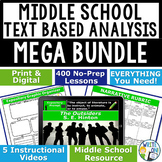
Description
Introducing how to write a literary analysis essay citing text evidence for "The Wretched and the Beautiful" by E. Lily Yu has never been easier! This in-depth text dependent analysis (TDA) writing prompt resource guides students through a step-by-step process of writing an opinion essay with textual evidence as support. It includes an argumentative writing graphic organizer , rubric, argumentative writing quiz , and an argumentative writing template .
All aspects of text evidence writing are covered in this resource: brainstorming ideas , developing a thesis statement , introducing supporting details , writing hooks and leads , and incorporating the 6 Traits of Writing ™. From the struggling writer to the advanced writer, this resource offers something for everyone.
The video, slide show, graphic organizer, worksheets, writing template, and rubric allow students to practice and develop their argumentative writing skills. The writing quiz reinforces guided note-taking techniques when used in conjunction with the instructional video. The detailed lesson plans make implementing argument writing easy for teachers .
This no-prep lesson is adaptable for in-class instruction, distance learning, or independent student work. The instructional video with writing tutorial and template can be presented as whole class instruction or assigned for students to complete at home.
All materials are available in both Google Drive™ and print formats, ensuring easy access for all students.
*****************************************************************************************
This Citing Text Evidence Argumentative / Argument writing prompt lesson includes:
Entertaining Instructional Video with:
- Brainstorming ideas
- Prompt identification and comprehension
- Thesis statement development
- Rubric explanation
- How to Write an Argumentative Essay tutorial and writing template
- How to Write an Argumentative Essay writing quiz / guided note-taking
Detailed Lesson Plan with:
- Common Core State Standards indicated on lesson plan
- Instructional Focus
- Instructional Procedures
- Objectives/Goals
- Direct Instruction
- Guided Practice
- Differentiation
- ESE Strategies
- ELL Strategies
- I Can Statement
- Essential Question
Worksheets with:
- Brainstorming section
PowerPoint Presentation with:
- Introduction slide with prompt (interactive for students to identify key vocabulary)
- Brainstorming slide (interactive for students to list ideas)
- Standard and implied thesis development slides
- How to Write an Argumentative Essay tutorial and writing template slides
- Checklist slide
Argumentative Writing Quiz
Argumentative Rubric
Argumentative Graphic Organizer
Google Slides ™
Check out my other Middle School Citing Text Evidence Writing Prompts:
- Citing Text Evidence Writing Prompts
Connect with me for the latest Write On! with Jamie news:
- Write On! with Jamie Blog
- FB Community for 6-12 ELA Teachers
. . . and visit my WRITE ON! with Jamie website for a free TEXT EVIDENCE WRITING LESSON!
© Google Inc.™ All rights reserved. Google™ and the Google Logo are registered trademarks of Google Inc.™ Write On! with Jamie® is an independent company and is not affiliated with or endorsed by Google Inc.™
Terms of Use
Copyright © Write On! with Jamie. All rights reserved by author. All components of this product are to be used by the original downloader only. Copying for more than one teacher, classroom, department, school, or school system is prohibited unless additional licenses are purchased. This product may not be distributed or displayed digitally for public view. Failure to comply is a copyright infringement and a violation of the Digital Millennium Copyright Act (DMCA). Clipart and elements found in this product are copyrighted and cannot be extracted and used outside of this file without permission or license. Intended for classroom and personal use ONLY.
Questions & Answers
Write on with jamie.
- We're hiring
- Help & FAQ
- Privacy policy
- Student privacy
- Terms of service
- Tell us what you think
- Share full article
Advertisement
Supported by
Guest Essay
George Clooney: I Love Joe Biden. But We Need a New Nominee.

By George Clooney
Mr. Clooney is an actor, director and film producer.
I’m a lifelong Democrat; I make no apologies for that. I’m proud of what my party represents and what it stands for. As part of my participation in the democratic process and in support of my chosen candidate, I have led some of the biggest fund-raisers in my party’s history. Barack Obama in 2012 . Hillary Clinton in 2016 . Joe Biden in 2020 . Last month I co-hosted the single largest fund-raiser supporting any Democratic candidate ever, for President Biden’s re-election. I say all of this only to express how much I believe in this process and how profound I think this moment is.
I love Joe Biden. As a senator. As a vice president and as president. I consider him a friend, and I believe in him. Believe in his character. Believe in his morals. In the last four years, he’s won many of the battles he’s faced.
But the one battle he cannot win is the fight against time. None of us can. It’s devastating to say it, but the Joe Biden I was with three weeks ago at the fund-raiser was not the Joe “ big F-ing deal ” Biden of 2010. He wasn’t even the Joe Biden of 2020. He was the same man we all witnessed at the debate.
Was he tired? Yes. A cold? Maybe. But our party leaders need to stop telling us that 51 million people didn’t see what we just saw. We’re all so terrified by the prospect of a second Trump term that we’ve opted to ignore every warning sign. The George Stephanopoulos interview only reinforced what we saw the week before. As Democrats, we collectively hold our breath or turn down the volume whenever we see the president, whom we respect, walk off Air Force One or walk back to a mic to answer an unscripted question.
Is it fair to point these things out? It has to be. This is about age. Nothing more. But also nothing that can be reversed. We are not going to win in November with this president. On top of that, we won’t win the House, and we’re going to lose the Senate. This isn’t only my opinion; this is the opinion of every senator and Congress member and governor who I’ve spoken with in private. Every single one, irrespective of what he or she is saying publicly.
We love to talk about how the Republican Party has ceded all power, and all of the traits that made it so formidable with Ronald Reagan and George H.W. Bush, to a single person who seeks to hold on to the presidency, and yet most of our members of Congress are opting to wait and see if the dam breaks. But the dam has broken. We can put our heads in the sand and pray for a miracle in November, or we can speak the truth.
We are having trouble retrieving the article content.
Please enable JavaScript in your browser settings.
Thank you for your patience while we verify access. If you are in Reader mode please exit and log into your Times account, or subscribe for all of The Times.
Thank you for your patience while we verify access.
Already a subscriber? Log in .
Want all of The Times? Subscribe .

COMMENTS
Essay Writing Guide for Students: Master the art of essay writing with a comprehensive guide. Learn effective techniques for structuring and expressing ideas.
The Beginner's Guide to Writing an Essay | Steps & Examples An academic essay is a focused piece of writing that develops an idea or argument using evidence, analysis, and interpretation.
Learn how to find an essay topic, structure your college essay, and how to write and revise a college essay all in our best essay writing guide.
Do you want to know how to write a good essay? Take a look at this list of 100 essay writing tips to build the best essay.
A curated collection of the best resources online and offline on How to Write an Essay.
How to Write a College Essay | A Complete Guide & Examples The college essay can make or break your application. It's your chance to provide personal context, communicate your values and qualities, and set yourself apart from other students.
Strategies for Essay Writing Strategies for Essay Writing Tips for Reading an Assignment Prompt Asking Analytical Questions Thesis Introductions What Do Introductions Across the Disciplines Have in Common? Anatomy of a Body Paragraph Transitions Tips for Organizing Your Essay Counterargument Conclusions Strategies for Essay Writing ...
Six top tips for University of Melbourne students on how to write a successful essay.
Essay Writing This resource begins with a general description of essay writing and moves to a discussion of common essay genres students may encounter across the curriculum. The four genres of essays (description, narration, exposition, and argumentation) are common paper assignments you may encounter in your writing classes.
Below, we provide some student samples that exhibit the key features the most popular genres. When reading through these essays, we recommend paying attention to their. 1. Structure (How many paragraphs are there? Does the author use headers?) 2. Argument (Is the author pointing out a problem, and/or proposing a solution?) 3.
Looking for college essay help? This guide explains who and how to ask so you can get the best advice on your personal statement.
An academic essay is a piece of writing in which you present your position on a topic, and support that position by evidence. An essay has three main parts: introduction, body, and conclusion. In the introduction, you put forward your position (this can take the form of a question or an argument) and its relevance to the chosen topic.
College Essay Guy - Personal statement and college essay tips, guides, resources, consulting, and webinars for students, parents and counselors.
Our example essays show you how to write a great college admissions essay, with detailed analyses of what works and why.
The Online Writing Lab (the Purdue OWL) at Purdue University houses writing resources and instructional material, and we provide these as a free service at Purdue. Students, members of the community, and users worldwide will find information to assist with many writing projects. Teachers and trainers may use this material for in-class and out ...
An essay is a type of assignment in which you present your point of view on a single topic through the analysis and discussion of academic sources. Usually, an essay has the format of an introduction, body paragraphs and a conclusion. Critical analysis is essential to essay writing. One way you can demonstrate this is by summarising and ...
Many students dread writing essays, but essay writing is an important skill to develop in high school, university, and even into your future career. By learning how to write an essay properly, the process can become more enjoyable and you'll find you're better able to organize and articulate your thoughts.
Home | Excel at writing | How to write... | Essay | How to build an essay
The Student Essay Writing Center provides you with help and advice in an easy-to-read and understandable format. Essay writing can be difficult, but it doesn't have to be. This resource is designed to make essay writing doable — even fun and exciting! Here you will learn how to brainstorm, write, structure, and revise your essay so that you ...
Writing essays can be an exciting task for students if they have enough time to conduct research to pen down an insightful piece of writing. But that isn't the case […]
A compelling college essay is a critical component of an Ivy League application, as it offers students the opportunity to showcase their personality and aspirations.
James Lang's "Writing Like a Teacher" offers a path to more engaging prose.
The Similarity Report Turnitin does not check for plagiarism. What we actually do is compare your submissions against our database and highlight wherever your writing is similar to one of our sourc...
Student motivation, whether the motivation to simply attend class or to pursue lifelong learning, is a complex but critical aspect in a student achieving the learning outcomes of any course, and each instructor has the ability to integrate it within their greater teaching philosophy.
DeafBlind essayist and poet John Lee Clark is the winner of the 2022 Krause Essay Prize, hosted by the Iowa Nonfiction Writing Program.
Academic writing is a formal style of writing used in universities and scholarly publications. You'll encounter it in journal articles and books on academic topics, and you'll be expected to write your essays, research papers, and dissertation in academic style. Academic writing follows the same writing process as other types of texts, but ...
A Room of One's Own raises a number of questions surrounding the place of women in society, culture, and education, and the competition allows students to contemplate these themes and ideas while developing the independent research and writing skills essential to university-level study.
But I now think that allowing AI use for student writing assignments is a mistake - at least in lower-level classes. It doesn't help students learn what I want them to learn through writing papers for class. So, I have banned its use. The ban is simple: students are not allowed to use AI in writing their papers.
Introducing how to write a literary analysis essay citing text evidence for "The Wretched and the Beautiful" by E. Lily Yu has never been easier! This in-depth text dependent analysis (TDA) writing prompt resource guides students through a step-by-step process of writing an opinion essay with textua...
Guest Essay. George Clooney: I Love Joe Biden. But We Need a New Nominee. July 10, 2024. President Biden at a fund-raiser in Los Angeles in June.